






The Canadian College of Naturopathic Medicine is the only pan-Canadian provider of naturopathic medical education in the country, with campuses located in Toronto, Ontario and Metro Vancouver, British Columbia.
The College is renowned worldwide as a leader in offering an innovative, learner-centric model of naturopathic medical education, exploring new areas of research, and producing well-trained graduates who make a positive difference in their communities.
To drive CCNM in its pursuit of excellence in naturopathic medicine, CCNM’s Board of Governors has developed five “Ends” or goals:
Excellence in Education
Educate naturopathic doctors on the basis of clear and focused curriculum, delivered by the most competent faculty, and graduate high-quality naturopathic doctors.
High-Quality Clinical Services
Provide high-quality naturopathic care in a clinical setting, resulting in positive educational experiences for students and positive outcomes for patients and clients.
Excellence in Research
Conduct and disseminate research relevant to naturopathic medicine and help develop skills among faculty, students, and graduates that foster research activity and a culture of evidence-informed clinical practice.
Leading Voice
Increase the awareness and trust of CCNM as a leading voice for naturopathic medicine.
Change Agent
Be a leader and advocate of naturopathic medicine as positive change to our health, our environment and our health-care system.
These ends enable the Board to develop the strategic direction that ensures the continued success and growth of the College. On behalf of my

colleagues, I am proud to showcase the stories within the report to the community this year that convey the spirit of collaboration and innovation.
Our first end speaks to the vital responsibility of CCNM’s faculty and administration in shaping naturopathic education so that graduates of the naturopathic program receive the knowledge and gain the skills necessary to sit for licensing exams. The College’s case-based curriculum, now in its second year, provides an experiential learning experience rooted in integration.
Our second end relays the importance of developing a robust clinical program that allows students to develop critical problem-solving skills and confidently apply their knowledge in real-world settings. This fulsome training at CCNM allows future NDs to step effortlessly into the roles that call for an individualized approach to treatment and prevention. In this report, we feature NDs from coast to coast who team up with other healthcare providers in multidisciplinary settings to better the health outcomes for the patients they serve.
Our third end underlines the importance of a growing body of evidence to support the efficacy of naturopathic therapies in areas such
as mental health, the microbiome, and nutrition. CCNM’s investigations into pertinent research topics are considered trailblazing and have yielded an increased understanding of naturopathic medicine’s underlying value when paired with conventional types of treatments. Furthermore, results from our research studies have been published in top-tier medical journals such as the Lancet and the Canadian Medical Association Journal.
Our fourth end relates to spreading awareness and being a leading voice for naturopathic medical education. As our graduates settle all over the world in varied careers in research, practice, public policy, authorship, and academia, they embody and teach the principles of naturopathic medicine through their conduct with patients, associates, and the community.
Finally, our fifth end drives longlasting and fundamental changes in health care for the benefit of all Canadians though our work in education, research, and clinical care.
In my first year as Chair of the Board, I have been pleased to witness the continued progress of the College as it pertains to the five ends. Much of our growth can be attributed to the students, faculty, staff, and graduates who play a special and cooperative role in advancing the College and the profession of naturopathic medicine. As demonstrated by the stories in our report to the community, CCNM will remain at the forefront of positive changes through these combined efforts.
Dr. David Duizer, ND Chair of the Board
One Institution. Two Campuses. One Team. This statement may seem simple, but it represents an approach that is forward facing, integrative, and relies on collaboration.
At the heart of CCNM, from its inception in 1978 and now as an institution with campus locations in Toronto, Ont. and New Westminster, B.C. (Boucher), is a spirit of partnership, innovation, and commitment that extends Canada-wide. The College is the largest naturopathic medical education provider in North America and the only accredited institution in the country that trains future NDs. We have achieved this remarkable accomplishment thanks to our collective dedication and responsibility towards the future of CCNM, shaped through decades of service to the profession.
Anniversaries of this nature are often a significant time for reflection on the challenges and achievements that faced the community as it expanded and established itself in the educational and health-care landscape. In addition to looking back, our 45th birthday provided an excellent opportunity to wrap a bow on our storied history and look ahead. The report to the community contains an excellent summary of the events at CCNM that commemorated this milestone. While the specific occasions were diverse – ranging from multiple alumni receptions to an on-campus open house for prospective students –excitement for the future was a consistent presence.
Our theme for the report to the community honours the value and contributions of NDs in interprofessional clinical, academic, and research settings. Although interprofessionalism is not a recent phenomenon, a greater focus on preventative therapies and whole-person wellness has created a sustained, higher demand for naturopathic medicine.
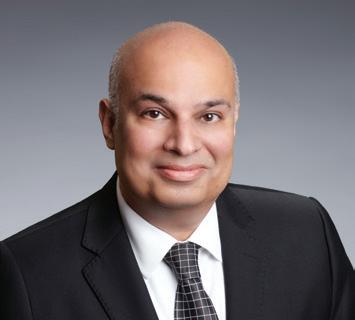
Both patients and health-care leaders recognize the need for the fulsome skill sets offered by NDs. At the inaugural lecture of the Karim Lecture Series in Integrative Care, presented on October 13, 2023 at the CCNM – Toronto Campus, we learned about the challenges to the health-care system in Canada and the advantages of team-based care. NDs fill in the gaps and bring a fresh, patient-centred perspective to integrative environments that may be otherwise lacking it; however, incorporating naturopathic knowledge into the conversation is only the beginning.
We are proud of the students and graduates who further the inclusion of naturopathic medicine into interprofessional spaces. Whether it is performing medical rounds at various hospitals around the City of Toronto, managing the response to the COVID-19 pandemic as a measure of public policy, or uniting with a team of various healthcare professionals for an empowering patient-centred experience in downtown Vancouver, the profession is expanding its reach and establishing the blueprint for future pathways of integrative care.
I wish to circle back to my initial declaration of one institution, two campuses, one team. Preparing for the future is not an abstract concept within the CCNM community; we take daily, active strides to ensure that our focus is oriented on the tools our students need to potentially become influential members of the naturopathic profession.
CCNM operates over a dozen clinical sites in Canada, in which we average approximately 38,000 patient visits per year. Our clinics are central to the naturopathic program at the College; interns at each campus receive critical, hands-on training under the supervision of registered NDs and assist in formulating patient treatment plans. CCNM’s clinics are unified under one umbrella, and our visual, online identity will soon reflect that with the creation of a singular website outlining every service CCNM offers to its catchment areas.
The rollout of our case-based curriculum continues. In September 2024, CCNM students entering their third year of the naturopathic program will be exposed to a model of academic delivery that promises to build on their existing skills and allow for the exploration of special health-related topics through interactive electives.
In Ontario and British Columbia, we continue to position the College for the future by reinforcing our foundations. Thank you to our internal and external supporters who share our vision. It is an exciting time to be associated with CCNM, and as we keep our gaze locked on the bountiful possibilities ahead, we are confident about our ability to positively impact the future of health care.
Dr. Rahim Karim, B.Sc., DC, MBA, CHE, ICD.D President & CEO
Our 45 th year was truly an opportunity to celebrate all that we have accomplished… and celebrate we did!

“This year, we begin the celebration of CCNM’s 45th birthday. The first class that graduated had 32 students and today we have almost four times that number graduating. As a pan-Canadian institution, we have graduated approximately 3,600 students, and this is just the beginning.”
Dr. Rahim Karim, B.Sc., DC, MBA, CHE, ICD.D President & CEO, CCNM
We celebrated many milestones in 2023. Graduates reached the end of their journey at CCNM at our convocation ceremonies in May and June, respectively. These students started CCNM in 2019 and had to navigate and adapt to the changing and challenging environment caused by the COVID-19 pandemic. They persevered through it all and developed incredible resilience as a result. It was heartwarming and inspiring to see our graduates come together with their friends and loved ones and take the next step on their path to becoming naturopathic doctors.
We marked the 10 th year of the bridge delivery of our program for international medical graduates (IMG) and we welcomed our largest IMG cohort this May to the Toronto Campus!
Our Open House event at the Toronto Campus this fall attracted a wide array of prospective students and their families to tour the campus, learn more about our program and clinics, and interact with representatives from our research department and the Naturopathic Students’ Association.
The Karim Lecture Series in Integrative Care was inaugurated by Dr. Ivy Oandasan, MD, MHSc., CCFP, FCFP, Professor, Department of Family and Community Medicine, Temerty Faculty of Medicine, University of Toronto. Her lecture, Integrative Care: Opportunities During a Time of Change, focused on the challenges to health care due to physician shortage and how a team-based approach would benefit both the health-care system and the patient.
“ For 45 years, our alumni have supported us as we’ve grown as an institution. We look forward to building our relationship for mutual benefit.”
Trevor Ellis, MBA, CPA Chief Financial Officer, CCNM
The College showcased our trailblazing research and continuing education opportunities, as well as connected with our alumni and supporters, at both the British Columbia Naturopathic Doctors’ (BCND) Advancing Naturopathic Medicine Conference and the Ontario Association of Naturopathic Doctors (OAND) Convention. A special 45-year anniversary reception held at the OAND Convention was attended by over 100 alumni.
Our staff and students also came together to celebrate throughout the year at our Welcome Back events in September, Employee Appreciation days and a special flag raising ceremony at our Toronto Campus.

Excitement was in the air as our graduates crossed the stage this spring to celebrate the completion of their academic journey at CCNM. Family, friends, and guests gathered at two ceremonies in Toronto and Metro Vancouver to witness this achievement and share in this momentous milestone.

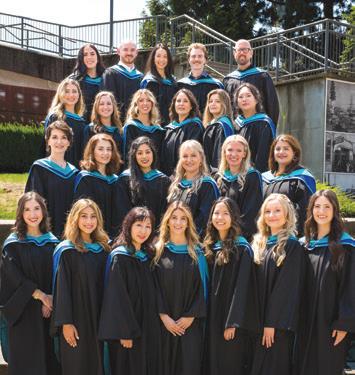
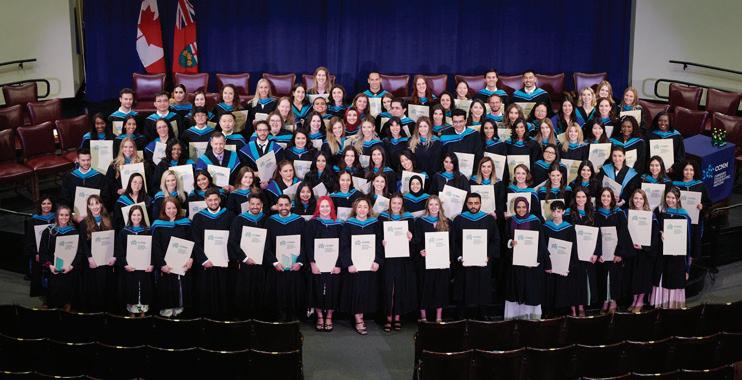

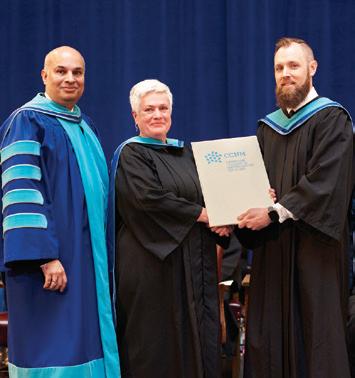
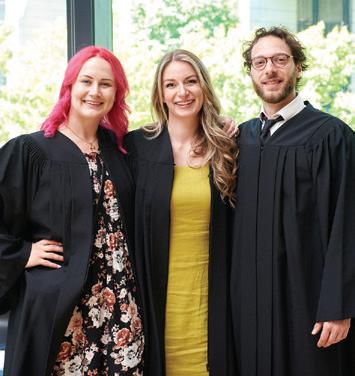

2023 marked the 10 th year of the bridge delivery of our program for international medical graduates (IMG). The IMG bridge delivery enables foreign-trained medical doctors living in Canada to further their health care careers as naturopathic doctors. In May 2023 , we welcomed our largest IMG cohort to the CCNM – Toronto Campus!
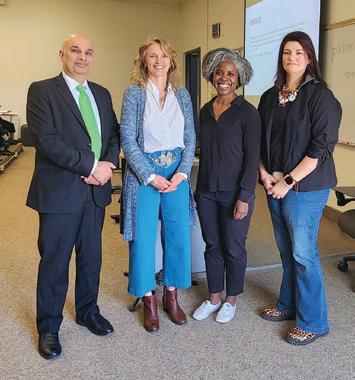
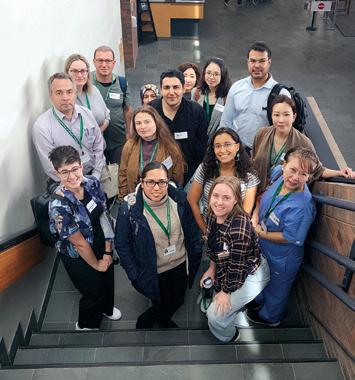

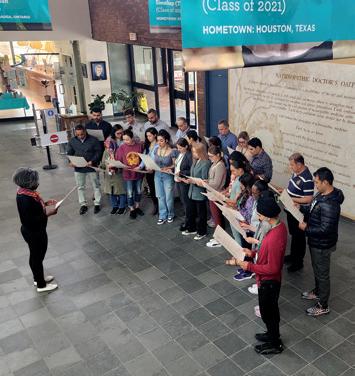
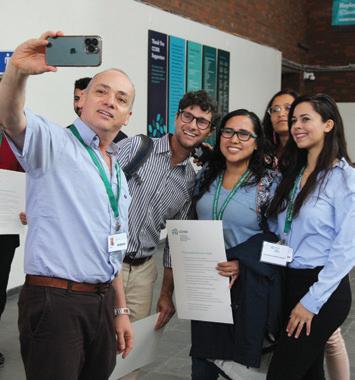
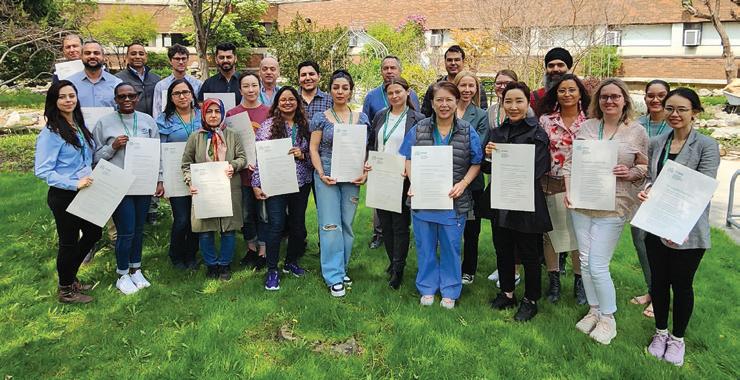

Our Open House in October 2023 attracted an array of prospective students and their families to the CCNM – Toronto Campus where they toured the College, learned more about our program and clinics, and interacted with representatives from our research department and Naturopathic Students’ Association.
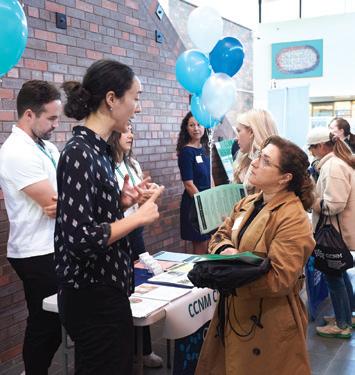
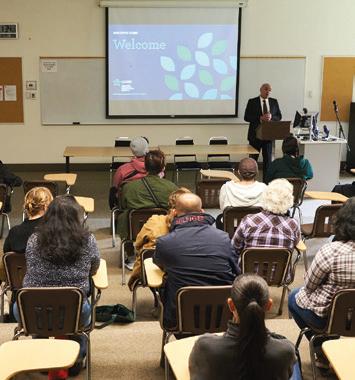
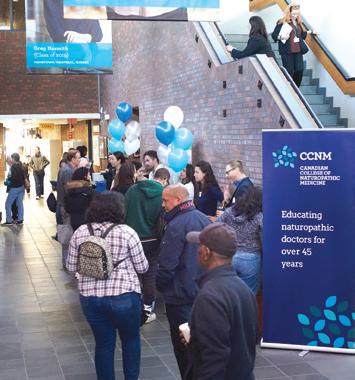

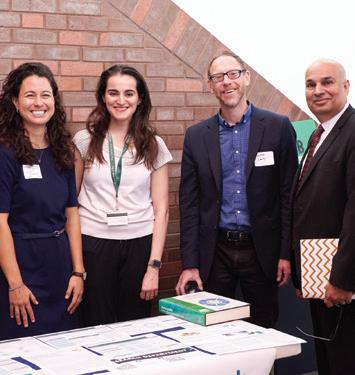
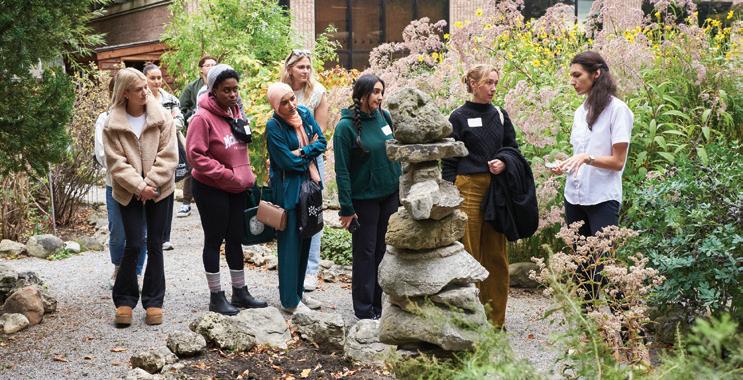


The inaugural lecture Opportunities During a Time of Change was delivered on October 13 , 2023 . Dr. Ivy Oandasan’s lecture focused on the challenges to health care due to physician shortage and how a team-based approach to health care would benefit both the health-care system and the patient.
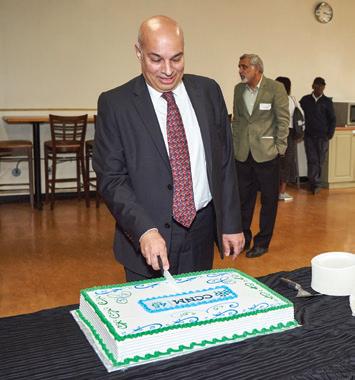
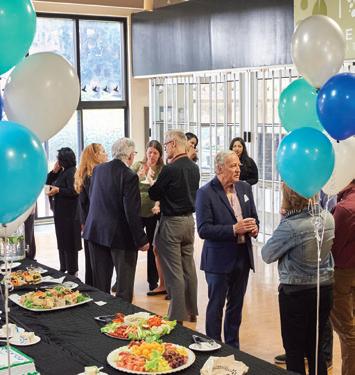
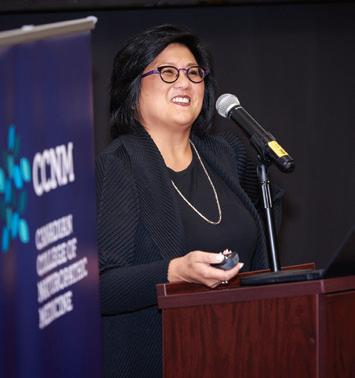
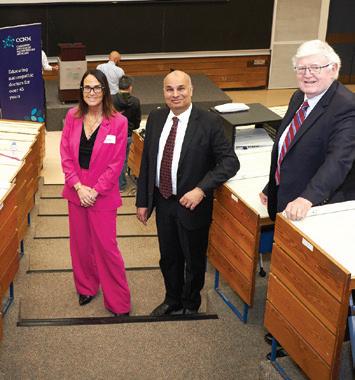
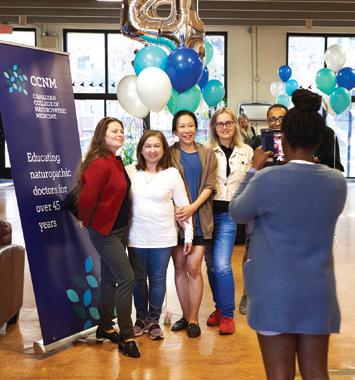
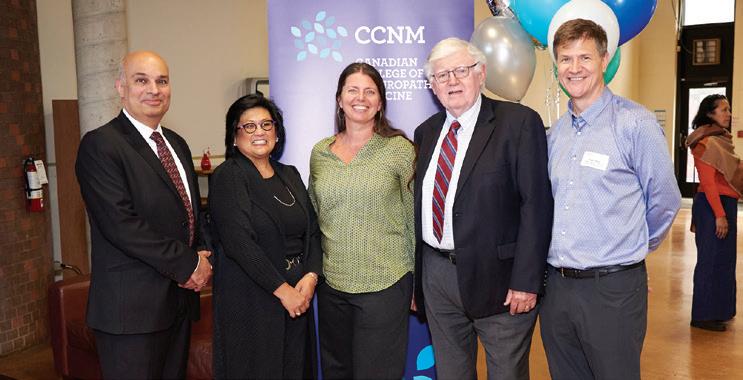

The College showcased all our trailblazing research and continuing education opportunities, as well as connected with our alumni and supporters, at both the BCND Advancing Naturopathic Medicine Conference and the OAND Convention. A special 45 -year anniversary reception held at the OAND Convention was attended by over 100 alumni.

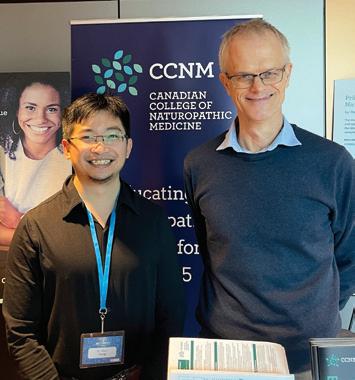
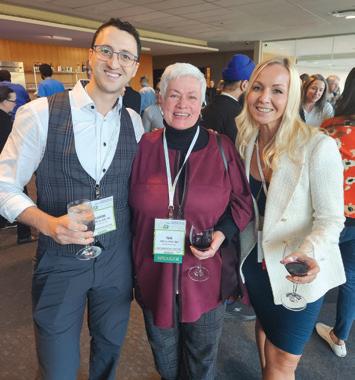
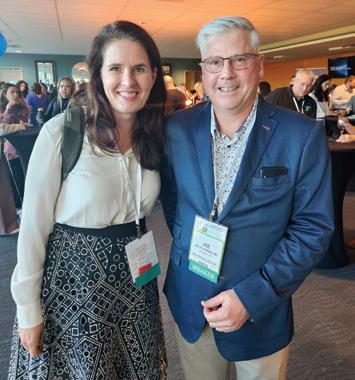
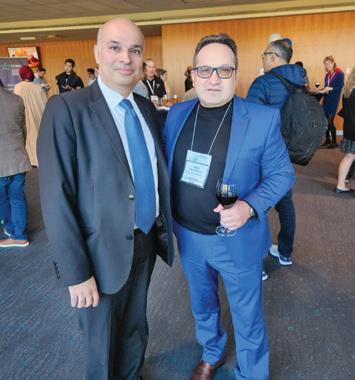
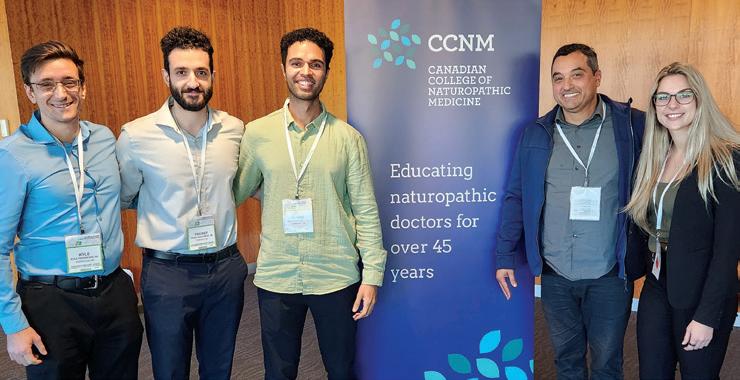

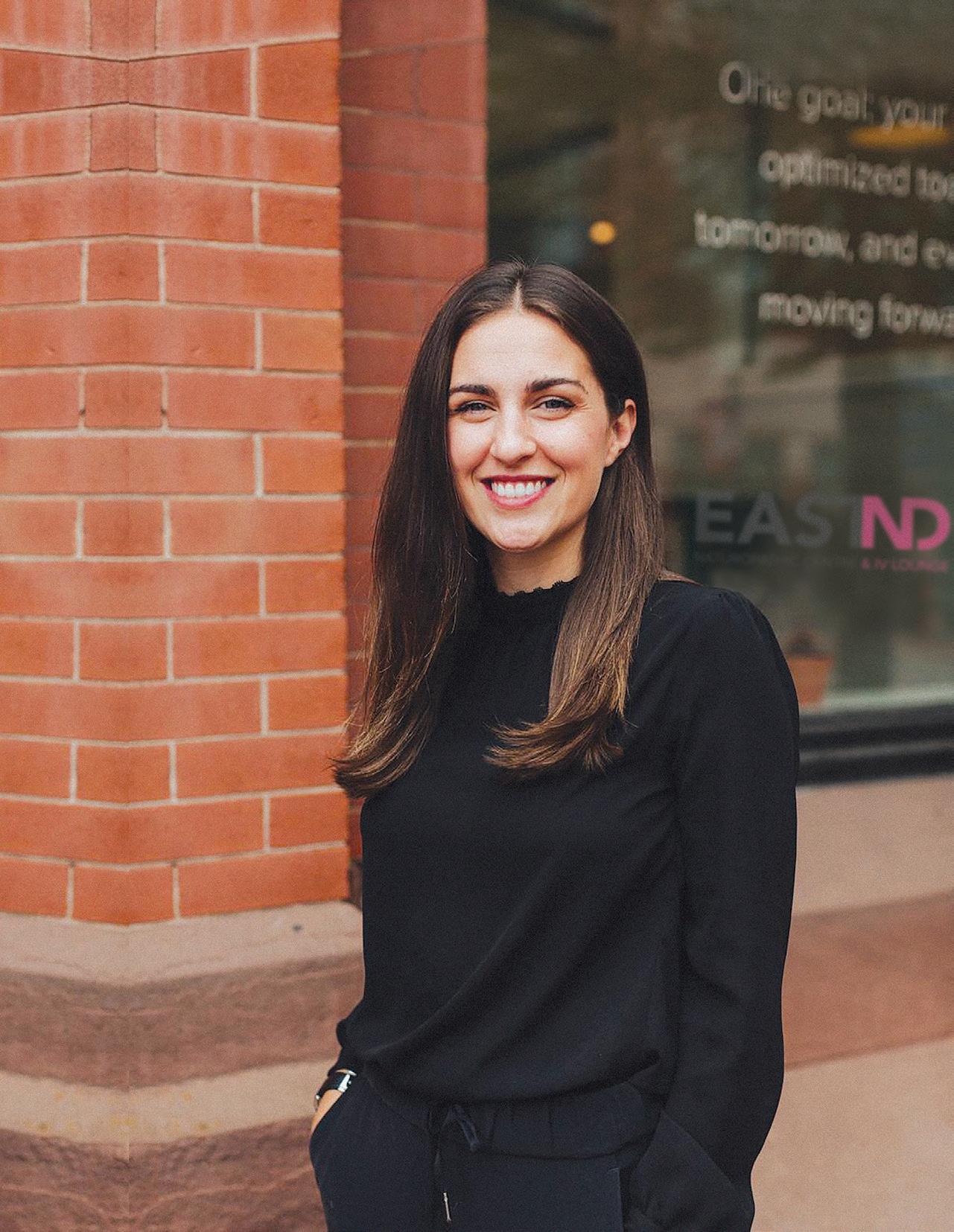
An integrative approach to client care at EASTND Naturopathic Centre & IV Lounge in Moncton and Fredericton on the east coast of Canada.
Dr. Jodie Tatlock, ND (CCNM – Toronto Class of 2016) started a solo practice in a small office in Moncton, New Brunswick, in 2018. Her desire for an integrative approach to client care led her to invite other health-care providers to join her, transforming Tatlock’s practice into the EASTND Naturopathic Centre & IV Lounge.
With the inclusion of additional health practitioners at EASTND, the demand for naturopathic services increased significantly. It soon became evident that the practice had outgrown its original space. Having faith in her vision, Tatlock made the bold move to relocate to a larger adjacent office space spanning 2,000 square feet. This decision laid the foundation for the EASTND clinic as it exists today.
EASTND eventually spread out across the province. Dr. Meghan Oxford, ND (CCNM – Toronto Class of 2021) started her practice in the Moncton clinic with Tatlock. Eventually, she returned to her hometown, opening the Fredericton, New Brunswick EASTND clinic. Operating in multiple cities means collaboration, advice-seeking, moral support, and brainstorming among the practitioners to foster a sense of connectedness crucial for their growth and supporting patients.
Regarding collaboration, Oxford, co-owner of EASTND in Fredericton, added, “I am beyond grateful for Jodie’s support throughout the years.

Opening a clinic and becoming a naturopathic doctor takes hard work that often goes unrecognized. It is important to surround yourself with people who will continue to build you up and support you. I think this is a huge key to success.”
The EASTND core values of collaboration and interprofessional patient care are front-and-centre,
regardless of whether practitioners come from the Toronto or Boucher campuses. As a result, EASTND attracts like-minded individuals who are passionate about naturopathic medicine and providing quality care. Dr. Nick Anhorn, ND (CCNM –Boucher Class of 2012) is one such naturopathic doctor who joined EASTND in 2022.
“ I believe it’s important to establish trusting relationships with not only our clients but also your colleagues and clinic owners. Together, mutual respect and support can propel your career forward. From the perspective of owning and operating clinics, I feel the most excited by those who show loyalty and a willingness to voice their needs while recognizing the many nuances of running the clinic.”
“One of the qualities that excited me about joining EASTND was the team atmosphere and emphasis on collaborative care,” says Anhorn. “With EASTND having many different professionals under its umbrella, it allows patient care to be streamlined and effortless from the patient perspective.”
Tatlock believes in staying within her naturopathic medicine expertise and involving other practitioners whenever necessary. Realizing when something is outside her skill set and then providing appropriate referrals ensures patients receive the best care possible.
“It can be refreshing to hear your health-care provider admit when something is not their expertise while simultaneously offering the name of the person who can step in to provide that quality care,” says Tatlock. “This creates a safe space for our clients as they know we want the best health outcomes for them.” The community has embraced this approach, with many patients consulting with multiple practitioners in the clinic.
Throughout the years, EASTND has experienced some growth in its team of practitioners, such as the addition of acupuncturists. Further, the ability to refer to licensed counsellors and the increasing interest in medical
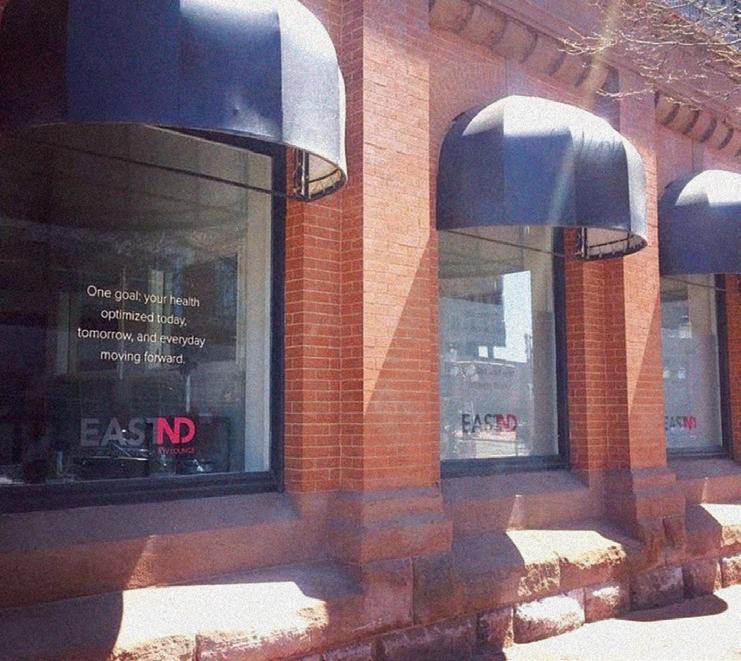
aesthetics focusing on helping individuals feel good inside and out have also shaped the clinic’s evolution.
For new CCNM graduates starting their careers, Tatlock emphasizes the importance of humility, appreciation, and resilience. Building a practice from the ground up requires consistent effort to engage with the community, and it may take at least a year, if not two, to establish a thriving practice.

EASTND has grown from a small individual practice to a thriving multi-location clinic through a dedication to interprofessional patient care and collaboration. With its dedicated team of practitioners and a commitment to providing optimal care, EASTND continues to impact the community positively.
“ One of the qualities that excited me about joining EASTND was the team atmosphere and emphasis on collaborative care. With EASTND having many different professionals under its umbrella, it allows patient care to be streamlined and effortless from the patient perspective.”
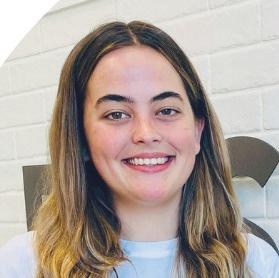
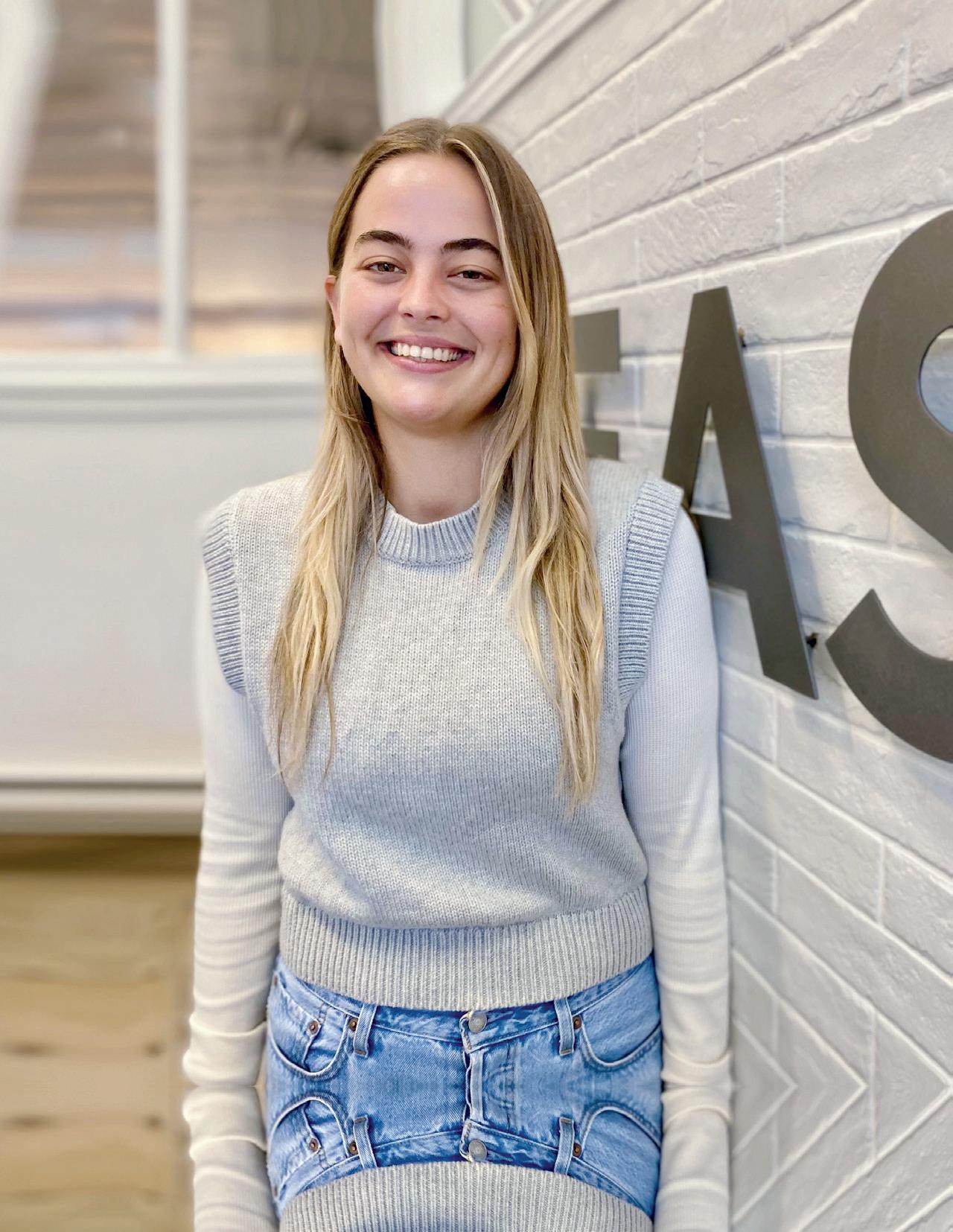
“ I am beyond grateful for Jodie’s support throughout the years. Opening a clinic and becoming a naturopathic doctor takes hard work that often goes unrecognized. It is important to surround yourself with people who will continue to build you up and support you. I think this is a huge key to success.”
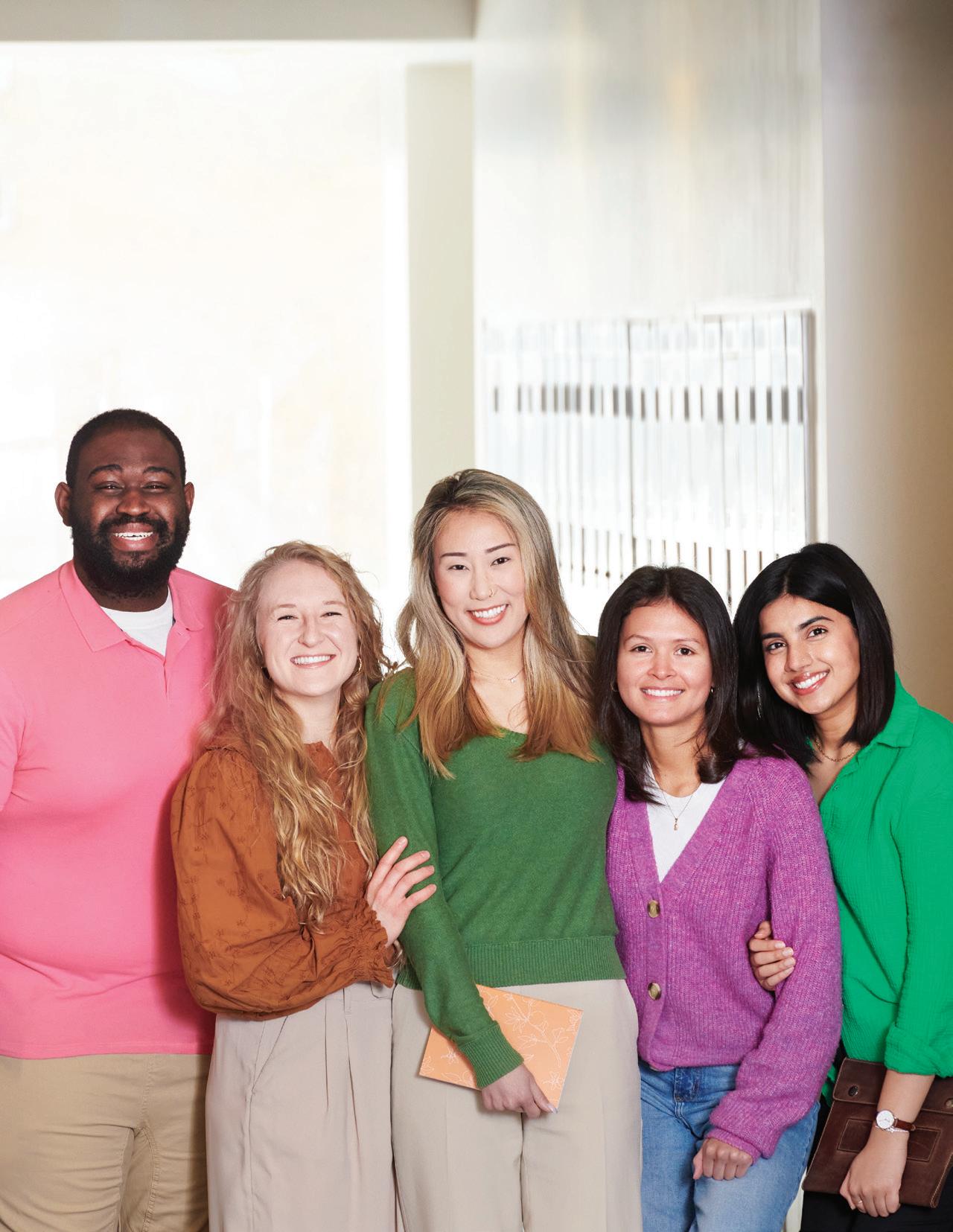
Moonsun Jang, CCNM’s Equity, Diversity & Inclusion (EDI) Officer, on EDI initiatives and advancements at CCNM.
Describe your main goal as CCNM’s Equity, Diversity, and Inclusion (EDI) Officer. My main goal is to cultivate an environment where every member of our community feels valued, supported, and empowered to reach their full potential. I strive to weave the principles of EDI into the fabric of our institution, ensuring that these values are reflected in our policies, practices, and day-to-day interactions.
Part of my focus is on empowering our community members through education, fostering cultural humility, and identifying and challenging barriers to create a more equitable learning and working environment.
In my role, I also serve as a bridge, connecting and supporting students, faculty, and staff from diverse backgrounds and creating spaces for their voices to be heard and meet their needs.
Through continuous assessment and strategic planning, I hope to identify areas for growth and improvement across both campuses, allocating resources effectively to drive meaningful change. My commitment extends to promoting accessibility, advocating for fair opportunities and fostering a culture of inclusion that permeates every aspect of the College’s operations.
Moonsun Jang’s description of equity, diversity, and inclusion:
Recognizing diversity, addressing disparities, and striving for fairness to ensure that every individual has the opportunity to reach their full potential.
Rising above the narrow confines of one’s own way of thinking, seeing, and being, and understanding one’s place in the larger context of all humanity.
Essentially, my main goal is to champion a holistic and transformative approach to EDI, fostering a College community that truly embraces and celebrates diversity in all its forms.
As this is a new role at CCNM, how did you make a change to the dynamic of our campuses? In my role as the EDI Officer, I have been working towards transforming both our campuses into more inclusive and equitable spaces. My approach has been multifaceted, which includes the development and implementation of robust EDI policies, serving as a key mediator in conflicts
More than simply diversity and numerical representation; bringing people together to foster authentic and empowered participation through a true sense of belonging.
Equity, Diversity, and Inclusion: Building a Culture of Empowerment for Staff, Faculty, and Students cont’d
arising from discrimination and harassment, and delivering educational programs to empower our community members. These initiatives aim to deepen the understanding of EDI intricacies, challenge discriminatory practices, and promote active consideration of EDI in every role to cultivate a more inclusive atmosphere within our College.
I have been fortunate to collaborate with various departments and committees to institutionalize EDI principles at all levels of the College, creating pathways for a holistic integration across all College-wide activities. The College has recently
reinstated the Accessibility Council, which aims to promote inclusivity and equal access across our campuses while actively addressing the needs and concerns of persons with disabilities.
Tell us about your background and interests in EDI.
Early in my career, I directed my lifelong passion for social justice towards working with diverse clients of equity-seeking groups on a one-onone basis. However, I realized that this work is not a sustainable way to bring about the changes I want to see in this world, and thus, I began to increase my capacity for impact by engaging in EDI efforts at an organizational level.
Throughout my career, I learned the tremendous importance of building an organizational culture that promotes equitable service, diverse talent, and inclusion and belonging of personnel at all levels in order to provide an alternative to the homogenized service offerings of the status quo.
I have had the privilege of contributing to and leading various EDI initiatives across diverse settings, including community organizations, mental health facilities, and post-secondary
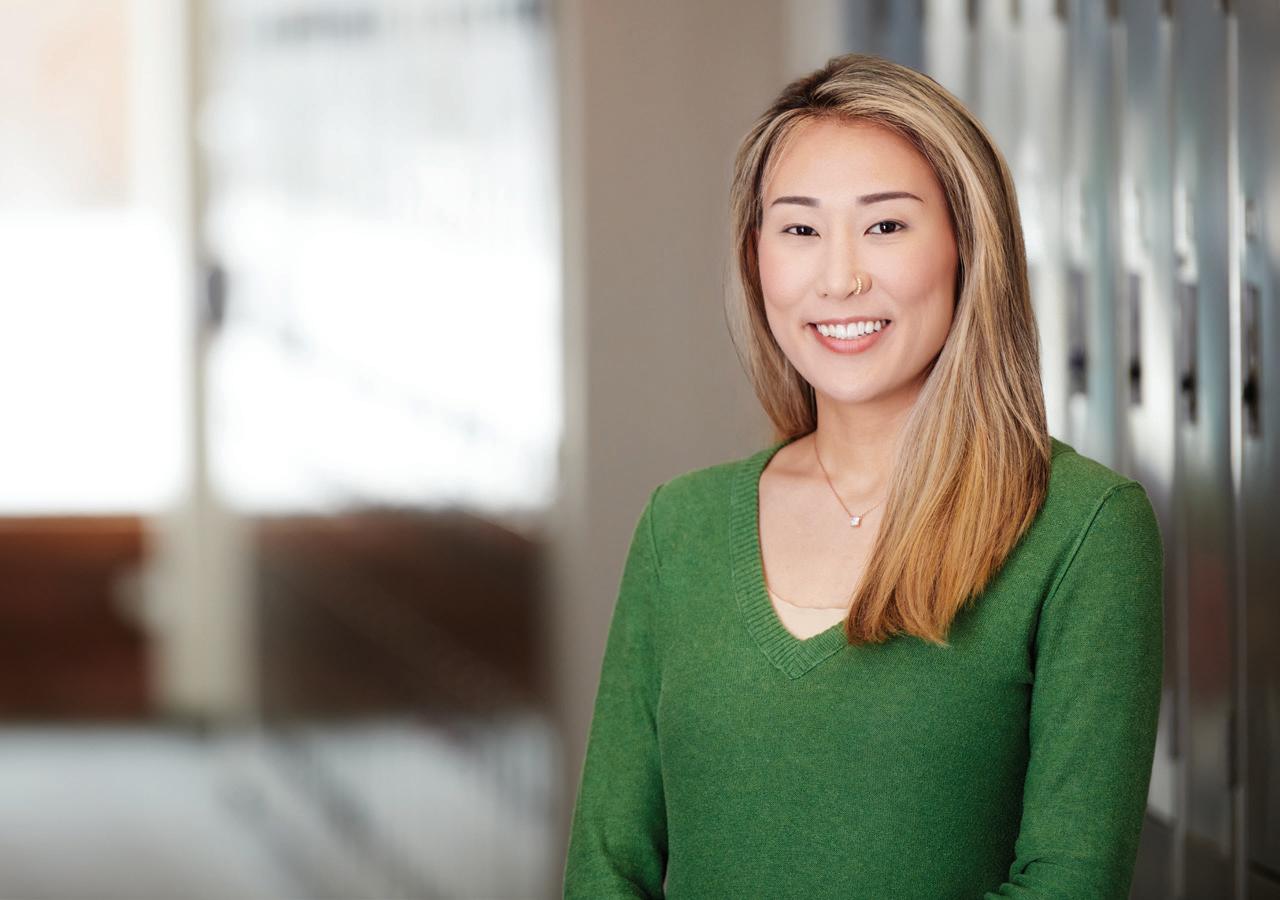
“ I hope to encourage all our community members to critically examine their own lived experiences, biases, and assumptions, and pave the way for more authentic and meaningful conversations around EDI and contribute to a culture of continuous learning and improvement.”
Moonsun Jang Equity, Diversity & Inclusion (EDI) Officer, CCNM
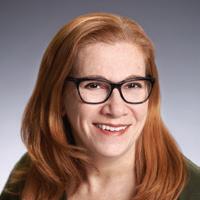
“ The College has a long commitment to the principles of EDI. Moonsun’s position as EDI Officer solidifies that commitment to the community at large. She has elevated our work to an incredible level, meeting regularly with employees, faculty, and students and defining our path going forward. She brings an awareness and understanding to all that she does in the many areas that her work covers.”
Barbara Young, BA Executive Director, Human Resources, CCNM
institutions. In these roles, I have gained invaluable experience in identifying systemic barriers, implementing strategic interventions, facilitating collaboration and open dialogues to promote a culture of equity and respect.
What do you strive for when communicating social awareness days with the College?
My primary goal is to foster a deep, nuanced understanding of EDI among our students, faculty, and staff. In my communications, I prioritize creating a safe and supportive environment for these discussions to take place. I am mindful of the diverse perspectives within our community, making sure that our social awareness initiatives are inclusive and respectful of all voices. My aim is to facilitate dialogues that are not only educational but also empowering, inspiring community members to take an active role in fostering a more equitable and inclusive College environment.
I believe that our social awareness days offer a unique opportunity for self-reflection and learning. Similarly, I hope to encourage all our community members to critically examine their own lived experiences, biases, and
assumptions, and pave the way for more authentic and meaningful conversations around EDI and contribute to a culture of continuous learning and improvement.
How would you personally describe equity, diversity, and inclusion? Diversity – rising above the narrow confines of one’s own way of thinking, seeing, and being, and understanding one’s place in the larger context of all humanity.
Inclusion – more than simply diversity and numerical representation; bringing people together to foster authentic and empowered participation through a true sense of belonging.
Equity – recognizing diversity, addressing disparities, and striving for fairness to ensure that every individual has the opportunity to reach their full potential.
Why is your role vital?
As societal awareness and understanding of EDI continue to grow and transform in the contemporary global landscape, it is imperative that educational institutions like CCNM remain at the forefront of these changes, especially as a post-graduate naturopathic medical school.
The EDI Officer position is central to ensuring that our faculty and staff are aware of EDI principles and empowered to integrate these values into their teaching and interactions with students. By providing ongoing education and resources, we also equip our educators and staff with the necessary tools and knowledge to impart the importance of EDI, fostering a culture of inclusivity and respect within the classroom and beyond.
Empowering future NDs to engage in culturally safe and relevant practices is a critical aspect of this role. As health-care providers, it is essential that they can connect with, understand, and effectively treat patients of diverse backgrounds, especially in our multicultural Canadian society.
By embedding EDI values into the fabric of our institution, we are positioning our students, faculty, and staff to be leaders and advocates for change in the broader health-care landscape.
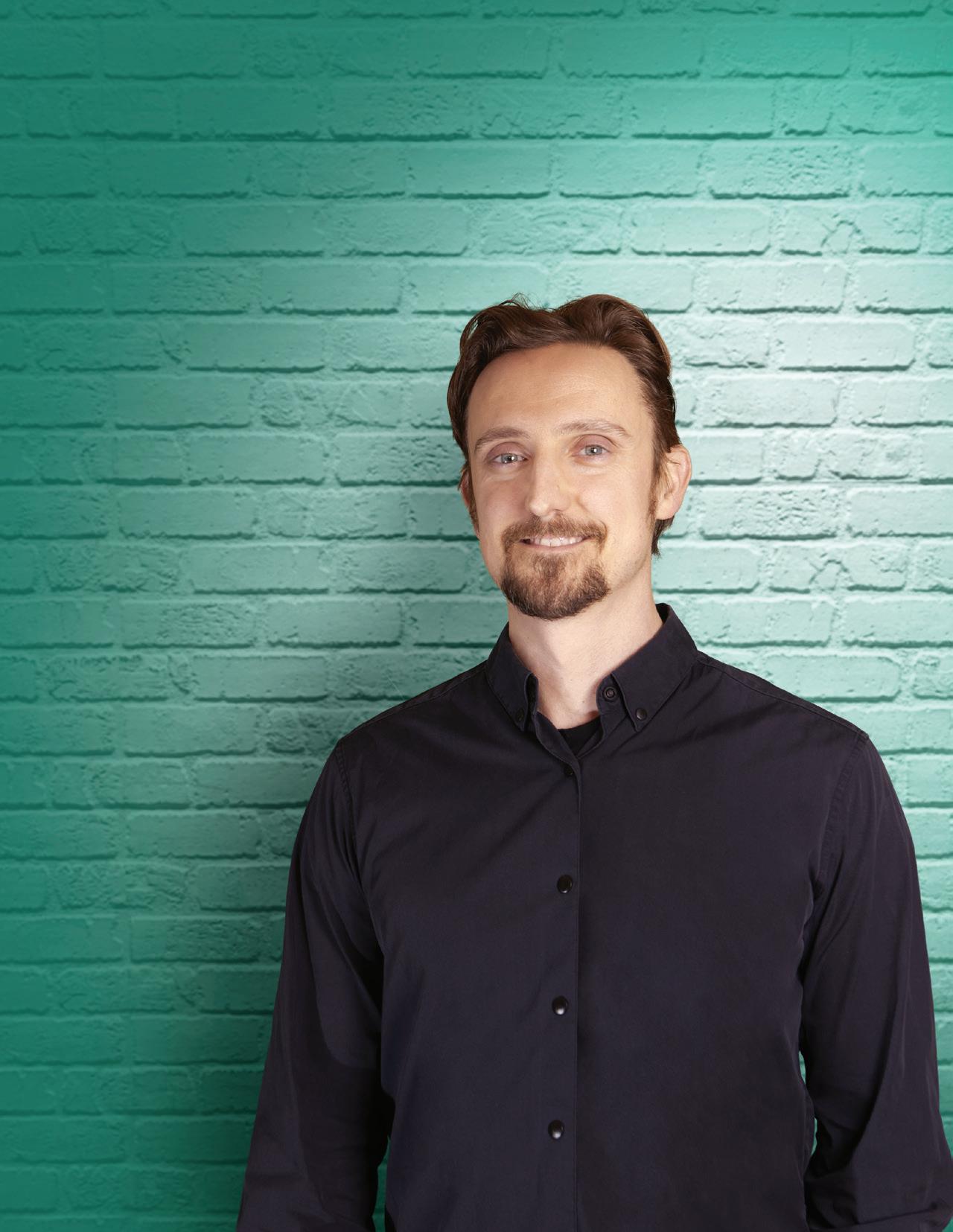
Promoting interprofessional collaboration.
Since its inception in 2013, Vancouver-based Empower Health has made a significant mark in the community with its innovative approach to patient care. Unlike other wellness centres and clinics where professionals work in silos, Empower Health promotes consistent interprofessional collaboration and team building.
Dr. Patrick Callas, ND (CCNM –Boucher Class of 2012) joined Empower Health as its Naturopathic Director in 2019. At that point, the in-house wellness centre evolved to provide a more therapeutic and trauma-informed focus, setting it apart from other integrative clinics.
Driven by the belief that optimal patient care is a result of working across a broad team of professionals, Empower Health engages naturopathic doctors, medical doctors, traditional Chinese medicine practitioners, registered nurses, psychologists, counsellors, massage therapists, osteopaths, physiotherapists, and more. This diversity of perspectives and expertise ensures that patients receive the integrative care they want and need.
This strong sense of community at Empower Health is integral to their comprehensive and collaborative approach. Regular team meetings, messaging software interactions, and effective communication channels create an inclusive and supportive environment. The management team leads by example, fostering professional and personal development for all practitioners.
Not surprisingly, Empower Health’s impact extends beyond their wellness centre walls: the local community and health-care professionals strongly support their endeavours. The community’s support has been instrumental in the wellness centre’s growth and resilience, particularly during the challenging times of the COVID-19 pandemic.
Empower Health’s reputation among health-care professionals has attracted interest and admiration, leading to collaborations and integration of naturopathic medicine into other clinics and care spaces.
One significant example of this interprofessional collaboration is Empower Health’s partnership with the UBC Pharmacology Department. Over a three-year study, Empower Health welcomed a fourth-year pharmacy student yearly, enabling shared learning and fostering a positive ripple effect for naturopathic medicine and interprofessional collaboration. This successful initiative has become an ongoing program, expanding to include more integrative care sites across the province.
Over a three-year study, Empower Health partnered with the UBC Pharmacology Department to welcome a fourth-year pharmacy student yearly, enabling shared learning and fostering a positive ripple effect for naturopathic medicine and interprofessional collaboration.


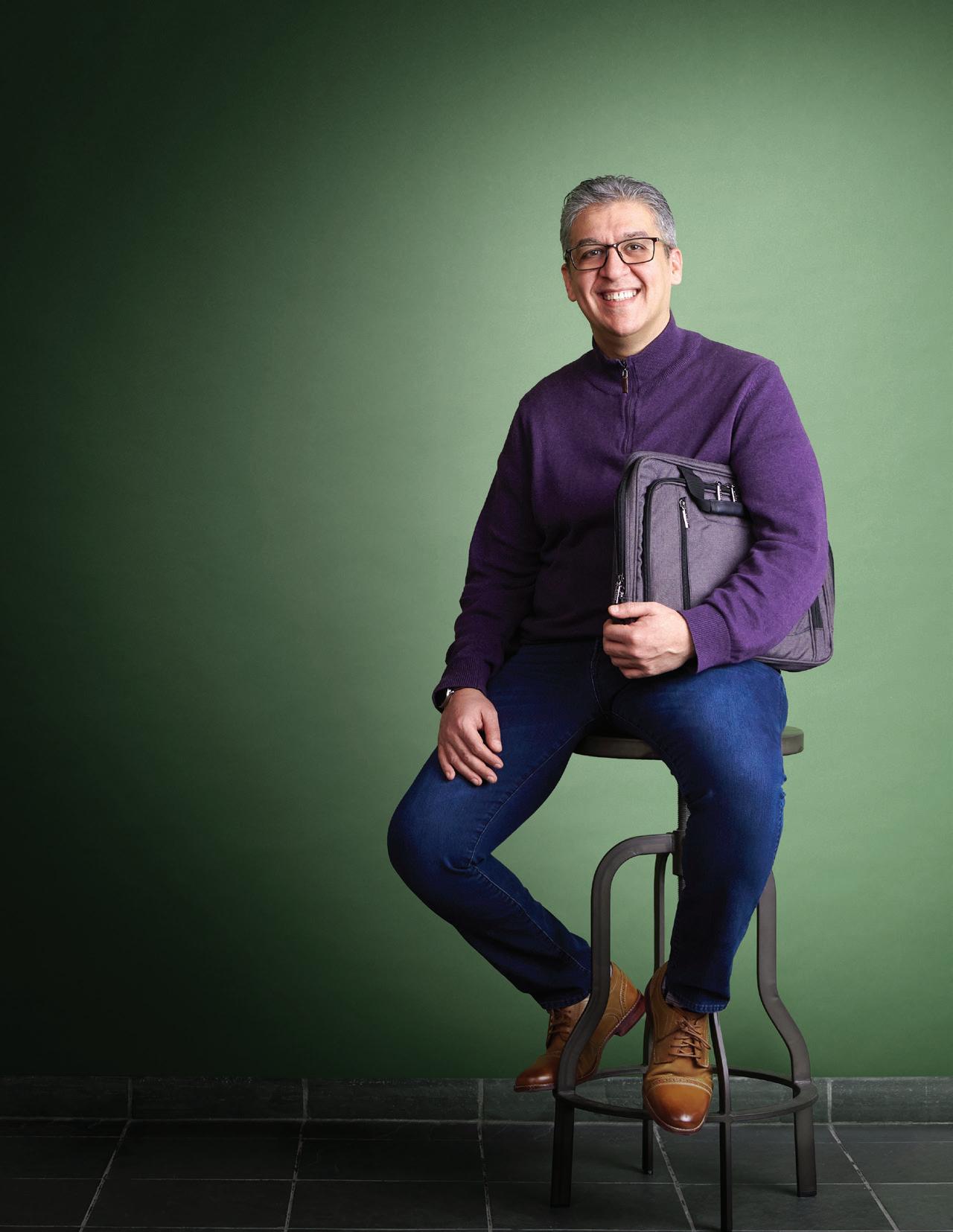
CCNM student Yasser Elmahalawy on embracing naturopathic medicine during a time of upheaval.
Many CCNM students often describe the discovery of naturopathic medicine as a lightbulb moment and the culmination of a personal or professional health-care journey. That was certainly the case for Yasser Elmahalawy, whose first encounter with the core naturopathic principles resulted in a life-changing moment.
After a number of years working in conventional medicine, interprofessional care, and government, Elmahalawy opted to pursue a new professional path that aligned with his calling.
From Cairo to Canada In 1994, Elmahalawy earned his medical degree from Ain Shams University in Cairo, Egypt and began his career as a general practitioner. Over several years, he gradually earned further certifications to augment his knowledge and skills.
Realizing that joining the medical field was a long and arduous process after he and his family immigrated to Canada in 2007, Elmahalawy elected

to travel between the two countries until 2017, when the health of his son, Tarek, rapidly declined. At that point, he moved to Canada permanently to stay with him. Two years later, after his son passed away, Elmahalawy took an extended break to cope with the loss.
The COVID-19 pandemic saw an opportunity for Elmahalawy to resume his career in health care. He was recruited to assist with the Case and Contact Tracing Management
Program, funded by the Government of Ontario. Initially, Elmahalawy worked for the Toronto Public Health Unit, where he helped track the spread of the virus. Several months later, in the spring of 2021, he was promoted to the First Nations and Inuit Health Branch at the federal level.
This proved to be a significant move for him, as it was during an ordinary team meeting that Elmahalawy learned about naturopathic medicine.

“A colleague mentioned naturopathic medicine and I ended up researching everything about it – traditional Asian medicine, botanicals, the healing power of nature, etc. All of it called to me,” he says.
Elmahalawy is set to graduate from the CCNM – Toronto Campus in May 2024, two years after he started the naturopathic medicine program in the international medical graduate (IMG) bridge stream.
“I had no idea that CCNM or naturopathic medicine existed, so when I discovered the school and what it offered, I had a feeling that this
was my place,” Elmahalawy recalls. “I told myself that the challenges and the limitations of my age won’t stop me from pursuing it, and I submitted my application one day before the deadline.”
Exposure to Indigenous models of health care in Canada had a profound impact on Elmahalawy. The parallels to naturopathic medicine are evident – both offer an array of holistic treatments that rely on prevention and stimulating the
inherent healing abilities of the body to address the underlying causes of illness. Additionally, naturopathic and Indigenous medicine focus on the benefits of regular, one-on-one interactions between a health-care provider and patient to bolster health outcomes.
Elmahalawy believes that the naturopathic profession can experience significant growth by fully realizing its complementary role alongside the universal health-care system, similar to the current function of Indigenous health care and separate in its regulation.
The parallels to naturopathic medicine are evident –all offer an array of holistic treatments that rely on prevention and stimulating the inherent healing abilities of the body to address the underlying causes of illness.
[i] Harfield, Stephen & Davy, Carol & Mcarthur, Alexa & Munn, Zachary & Brown, Alex & Brown, Ngiare. (2018). Characteristics of Indigenous primary health care service delivery models: A systematic scoping review. Globalization and Health. 14. 10.1186/s12992-018-0332-2.
HOLISTIC HEALTH CARE
CULTURALLY APPROPRIATE AND SKILLED WORKFORCE
CONTINUOUS QUALITY IMPROVEMENT SELFDETERMINATION AND EMPOWERMENT
ACCESSIBLE HEALTH SERVICES
FLEXIBLE APPROACH TO CARE
COMMUNITY PARTICIPATION
And with convocation and licensing exams approaching, Elmahalawy is focused on utilizing his extensive, wide-ranging background in health care and policy to positively contribute to the health and wellness landscape in Canada.
“How I put all my experiences together is not clear to me yet,” he reveals. “But there are many opportunities available to us. We can be primary care providers; we can be an asset to the health-care system with our clinical experience and academic expertise. All we need to do is raise our voices and say, ‘We can help.’”
“ A colleague mentioned naturopathic medicine and I ended up researching everything about it –traditional Asian medicine, botanicals, the healing power of nature, etc. All of it called to me.”
Yasser Elmahalawy
IMG Year 2 Student
CCNM – Toronto Campus


“ I believe reaching this point of life, especially in this part of the world is a blessing; the diversity within Canada is empowering and inspires me. From a naturopathic medicine perspective, I believe our health-care system would strongly benefit from incorporating natural healing therapies with support from our leaders.”
Yasser Elmahalawy
IMG Year 2 Student, CCNM – Toronto Campus
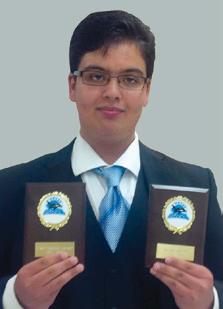
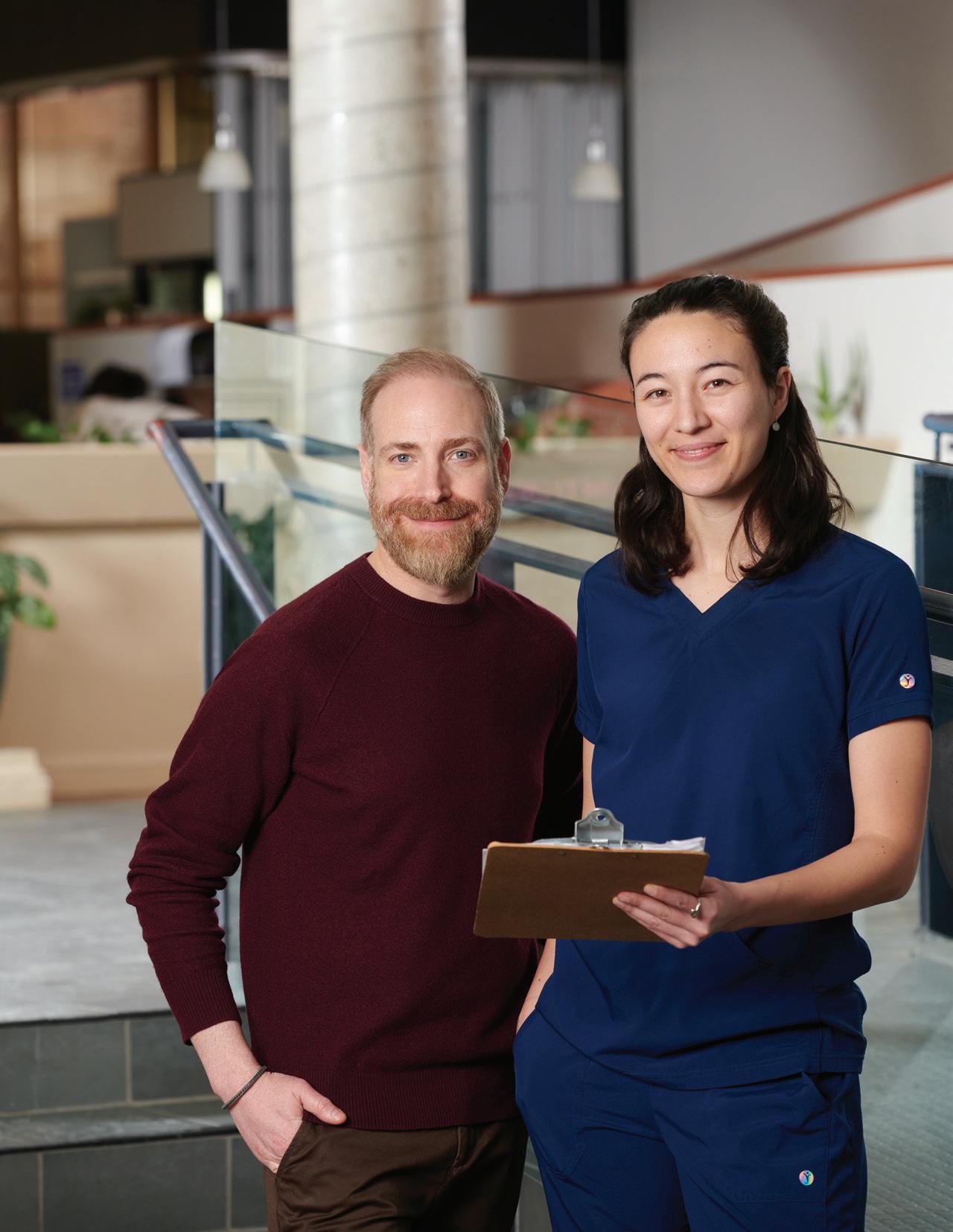
Celebrating a milestone of interprofessional and naturopathic care.
The CCNM Integrative Cancer Clinic (CCNM ICC) has been at the forefront of providing integrative health care for cancer patients for five years now.
Dr. Dan Lander, ND (CCNM – Toronto Class of 2006), Clinic Director, and Dr. Nadine Kexel, ND (CCNM – Toronto Class of 2021), reflect on the evolution of the clinic and the importance of promoting interprofessional care within its ecosystem.
Since its inception, the CCNM ICC has grown and developed a dedicated team of practitioners who have leaned into collaboration across disciplines. This approach is vital to integrating conventional care within the team’s treatment plans. Lander highlights the genuine dedication and effort required to prioritize harmonious teamwork, emphasizing the importance of attracting individuals passionate about integrative care.
Dr. Nadine Kexel, ND is one of these individuals. After completing her student internship at CCNM, which included training in cancer care, Kexel applied for the open residency position at the CCNM ICC, where experienced practitioners, including Lander, have mentored her.
The approach to interprofessional collaboration has facilitated the expansion of naturopathic medicine expertise into the community, including hospitals. Partnerships
have been forged with oncologists at Sunnybrook, St. Michael’s, Markham Stouffville and Southlake hospitals. This growing interest from conventional health-care providers indicate a shift towards a more integrative approach.
Kexel has expanded her knowledge by shadowing oncologists at Sunnybrook and Markham Stouffville. This experience has provided her with valuable insights into conventional approaches to cancer care, including treatment options, the decision-making process, and the patient experience. Furthermore, she has gained an understanding of treatment administration in a hospital setting.
One of the valuable perspectives that Kexel brings to conventional oncology approaches is the integration of diet, lifestyle, and evidencebased naturopathic therapies. The oncologists she has spent time with are interested in learning more about proper nutrition, supplements, and vitamin D dosing benefits, and this has led to many meaningful discussions on how conventional
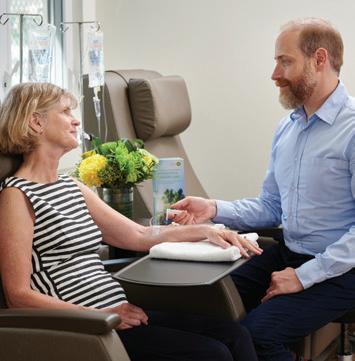
Expansion of Naturopathic Medicine
Expertise into the Community
Partnerships have been forged with oncologists at: Sunnybrook Hospital
St. Michael’s Hospital Markham Stouffville Hospital Southlake Hospital
oncology and naturopathic cancer care can work together to support patients during and after treatment.
Kexel led a free nutrition program for patients to learn about the intersection of diet and lifestyle in their care and recovery.

Patients who seek integrative care at the CCNM ICC are empowered to take a proactive role in their health journey. They desire to make healthy lifestyle and dietary changes alongside their conventional cancer treatments. The CCNM ICC fills the gap by providing information on natural health and empowering patients to make informed choices.
Patients feel they are being proactive, which positively impacts their mental health. Moreover, the clinic’s programming, such as yoga classes, mindfulness groups, cancer nutrition
courses, and sleep programs, focuses on optimizing patients’ overall well-being.
The Next Five Years Lander envisions the CCNM ICC expanding its group programming, which has received positive patient feedback. Funding has enabled these programs to exist free of charge, and there is a desire to expand services such as Mistletoe IV therapy, which has shown promising results in other countries.
Additionally, the CCNM ICC aims to become more involved in research and hopes to participate as a site for clinical trials in collaboration with CCNM’s Patterson Institute for Integrative Oncology Research. Lander also dreams of establishing

“ Don’t be too hard on yourself when planning your career path. It’s most important to follow what you’re passionate about and interested in. Attend conferences and go after opportunities such as residencies and preceptorships. You gain valuable insights into your desired practice areas by shadowing experienced practitioners and learning from their approaches and patient interactions.”
Dr. Nadine Kexel, ND (CCNM – Toronto Class of 2021)
a teaching clinic at a cancer centre to integrate naturopathic cancer care further into the mainstream oncology system.
Kexel’s journey as a resident at the CCNM ICC has deepened her understanding of cancer care and reinforced the vital role that naturopathic medicine plays in supporting patients throughout their cancer journeys. With her dedication and passion, Kexel makes a meaningful impact in her patients’ lives and will do more of this as she moves forward in her career.
The CCNM Integrative Cancer Clinic has made significant strides in revolutionizing the approach to cancer care in the past five years. Through interprofessional
collaboration and fostering relationships with conventional medical providers, the clinic has expanded its reach and provided integrative care to a broader range of patients. With a focus on patient empowerment and well-being, the CCNM ICC continues to evolve and pave the way for a more holistic approach to cancer treatment.

CCNM ICC offers scientifically grounded, evidence-informed natural cancer care, to strengthen the immune system, support the body’s inherent healing ability, and help sustain wellness during cancer treatment.
Naturopathic Medicine
Psychotherapy & Counselling
Intravenous Therapies
Yoga Therapy
Acupuncture
Massage
Mistletoe Therapy
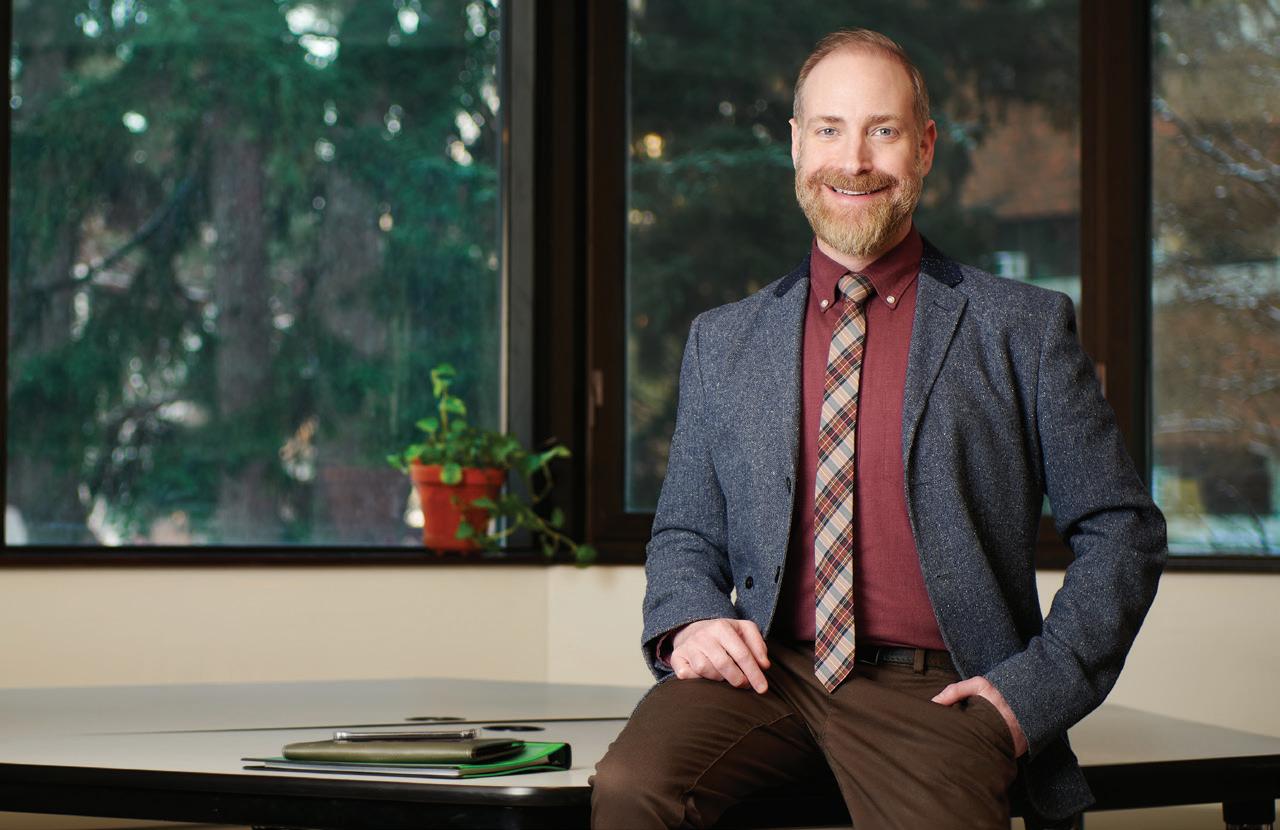
“Personal connections with other medical providers significantly impact your professional growth and career and ability to help patients. I encourage new graduates to actively network and reach out to establish trust and collaboration with other professionals in the health-care field.”
Dr. Dan Lander, ND (CCNM – Toronto Class of 2006)
Six of the College’s brightest minds share their passion for naturopathic medicine and their thoughts on CCNM’s case-based curriculum.
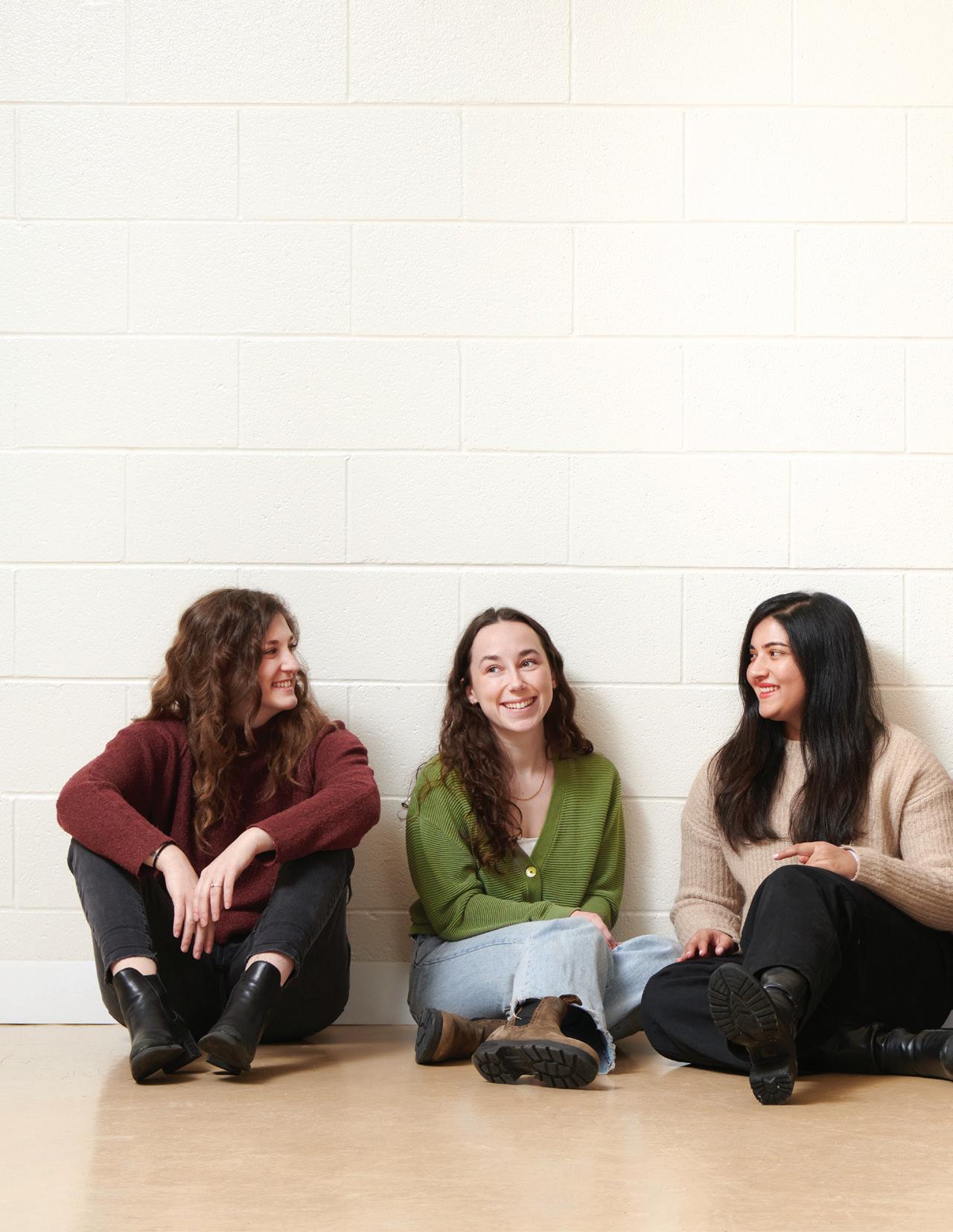
First-year student, CCNM – Toronto Campus Hometown: Baltimore, Maryland
Second-year student, CCNM – Toronto Campus Hometown: Barrie, Ontario
Second-year student, CCNM – Toronto Campus Hometown: Halifax, Nova Scotia
CCNM rolled out an innovative model of case-based learning in September 2022 to students at both the CCNM – Toronto and CCNM – Boucher Campuses. Now in its second year, this learner-centric approach to education is an opportunity for students to put theory into practice and develop the relevant skills and real-world experiences needed to become licensed naturopathic doctors.
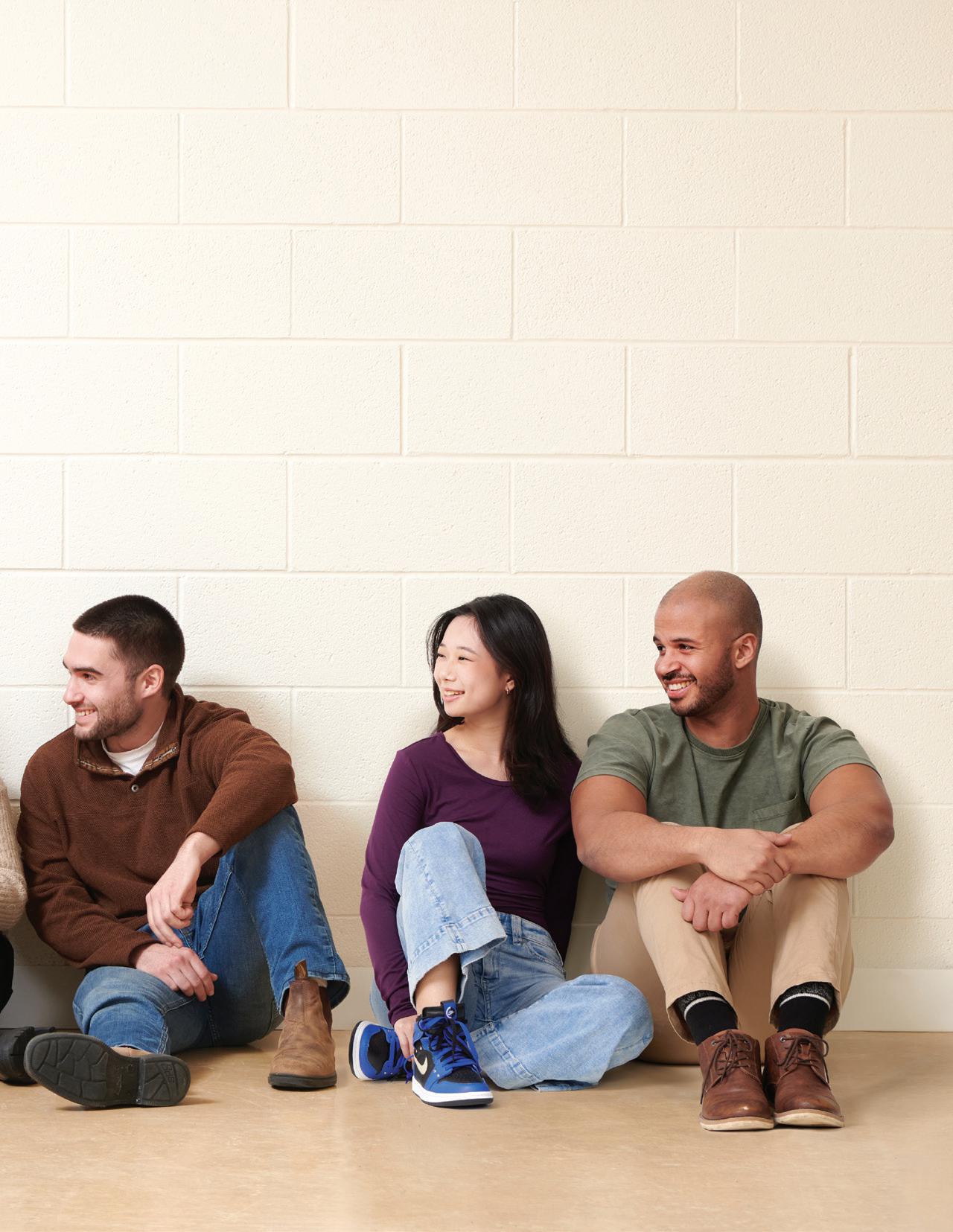
First-year student, CCNM – Toronto Campus
Hometown: Georgetown, Ontario
First-year student, CCNM – Boucher Campus
Hometown: Richmond, British Columbia
Second-year student, CCNM – Boucher Campus
Hometown: Nanaimo, British Columbia
Tell us about what drew you to naturopathic medicine.
Jade Slaughter: I always knew that I wanted to go into health care. I explored it all throughout high school, but I just didn’t resonate with the medical field.
I was exposed to NDs when I started volunteering at a naturopathic health clinic (owned by Dr. Anna Falkowski, ND, CCNM – Toronto Class of 2003). The holistic perspective of looking at the entire individual and treating the root cause really connected with me. It’s also preventative, which I love too. In addition to that, the scope of practice is wider than other natural and holistic professions. We have so many tools we can draw from, like botanical medicine, traditional Chinese medicine, nutrition, etc. So, it was those aspects that drew me to the profession.
Anthony Colonico: I went undiagnosed with Lyme disease for almost nine years, and the process of getting the diagnosis and receiving treatment with allopathic and alternative medicine is what drew me to this field. I originally wanted to be a
lawyer and I went to law school at the University of Ottawa with the goal of advocating for alternative medicine and integrative health care. But once I got there, I realized that I wanted to advocate for people and help them through their own issues.
In law school, I had this idea that we could change the system just by rewriting policy. But I soon realized, in my classes and talking to professors, that isn’t the reality. And a lot of the time, the push for change comes from the profession and the people that are involved in it. I wanted to be a part of that push and have a handson experience with patients who also want that push. So, I came to CCNM to explore that path.
Ketnavi Ramgoolam: I’m originally from Mauritius but I’ve been living in Halifax, Nova Scotia for the past eight years. After completing my undergrad at St. Mary’s University in 2019 with a degree in chemistry, life took an unexpected turn. The pandemic hit, and I started experiencing health
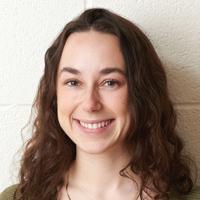
issues that took a toll on me, both physically and mentally. I was also working from home for a tech company, and I realized it wasn’t the path I wanted to continue on.
It was during this dark period that I sought the help of an ND (Dr. Priya Joshi, ND, CCNM – Toronto Class of 2000). Meeting my ND was a profound moment; it felt like seeing light at the end of the tunnel. That one decision to see an ND in Halifax turned out to be incredibly rewarding as it not only provided me with a new perspective on health care, but also revealed an entirely new career path that resonated deeply within me.
Emily Kravet: I’m from Baltimore, but I’ve been living in Rome, Italy for the last seven years or so. My background is graphic design, but almost everyone in my family is involved in health care. I was surrounded by it growing up and interested in it, but when I had to decide between the two paths of medicine and art, I felt art aligned with my values.
“ The holistic perspective of looking at the entire individual and treating the root cause really connected with me. It’s also preventative, which I love too. In addition to that, the scope of practice is wider than other natural and holistic professions. We have so many tools we can draw from, like botanical medicine, traditional Chinese medicine, nutrition, etc. So, it was those aspects that drew me to the profession.”
Slaughter Second-year student, CCNM – Toronto Campus
I had no idea naturopathic medicine existed until I ended up working for the Association of Accredited Naturopathic Medical Colleges (AANMC) last year. Everyone there is so nice and the NDs I’ve worked with are amazing. I knew that in combination with knowing more about the field, the welcoming community, and how NDs are so willing to expand their knowledge, naturopathic medicine was the place for me.
Carissa Sy: I completed my kinesiology degree at Western University, and after my final
semester there I went straight to my first semester at CCNM. There was a very short overlay.
I’ve always wanted to go into health care, but conventional medicine was the path that I was told was the only option. I didn’t know that naturopathic medicine existed or what it entailed. I learned by accident when I volunteered at one of CCNM’s satellite community clinics in Vancouver as I was finishing up my undergrad, around June 2023. I didn’t know the clinic had NDs and student interns. So, when I ran into them and they told me about
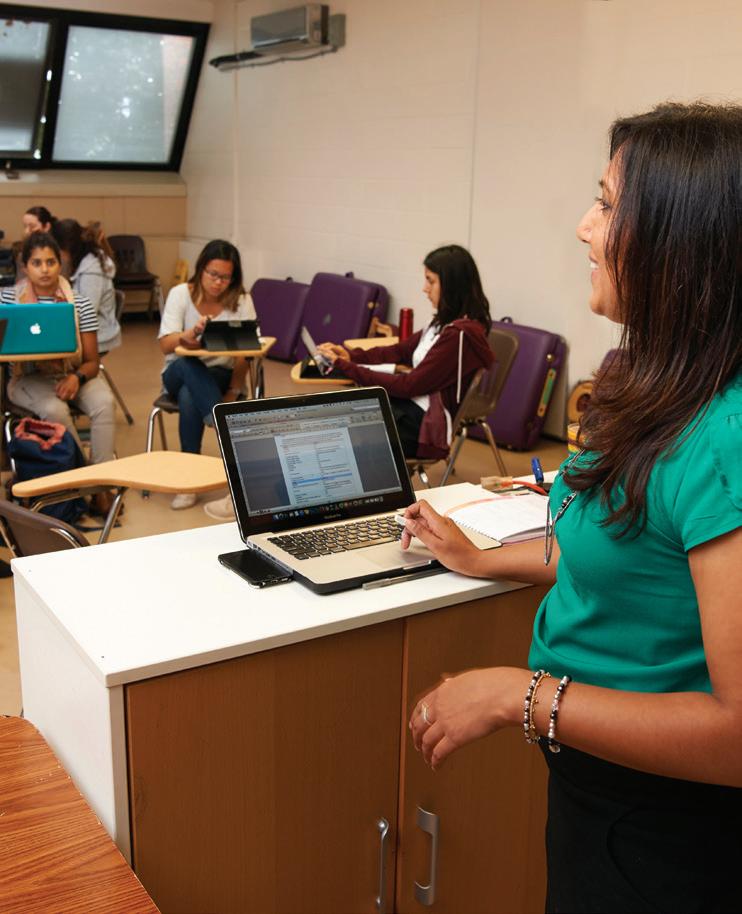
naturopathic medicine, it just fell into place. I went down a rabbit hole and haven’t turned back since.
In my class, there’s a wide variety of students. Some have known for 10 years that they’ve wanted to go into this field. Some found out only two or three years ago. Then, there are a couple of us who just found out about it. Naturopathic medicine sticks like no other in terms of a profession. It’s quite something to find a career that encapsulates a lot of the values that you want to emulate in your own practice as a health-care provider.
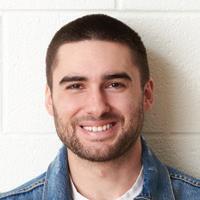
“ In law school, I had this idea that we could change the system just by rewriting policy. But I soon realized, in my classes and talking to professors, that isn’t the reality. And a lot of the time, the push for change comes from the profession and the people that are involved in it. I wanted to be a part of that push and have a hands-on experience with patients who also want that push. So, I came to CCNM to explore that path.”
Diego Souza-Franco: I’m originally from Brazil and I’ve been in B.C. for about 10 years. My background is in business and law, but then I decided to undergo a major career change.
There are a few things that gave me a taste for helping people in terms of health. One – I had my son in the car on the drive to the hospital, about six years ago. That shifted my
perspective about life and made me think about what was important. The second was that I worked in a hospital and fell in love with the idea of genuinely helping people without expecting anything back. It was the most rewarding experience that I’ve ever had in my life, so I went back to school at Vancouver Island University and majored in neuroscience. I did it all with the idea of becoming a conventional doctor.
2I took a health psychology class one semester, and we had an ND come in and tell us about naturopathic medicine. It made so much sense and aligned with everything that I believe in. Later, I visited the ND and I asked him, ‘What’s the best part of your job?’ He said, ‘The patients I never see again because I helped them.’ And that was it for me. I went ahead and I applied to CCNM.
Describe your school experiences thus far. What has been the most enjoyable part of being CCNM student?
Jade: It’s definitely been challenging at times. But the one thing that’s helped me through the struggles – and the most enjoyable part of my time at CCNM so far – has definitely been my classmates. I’ve never been in a kind of space where I feel so connected to everyone. We may come from different backgrounds but we’re all like-minded.
Anthony: When I looked into this program, I was eager to learn about the sciences, therapeutics, and philosophical ideas surrounding this field and how it contrasts with allopathic medicine. And I feel like I’ve been given all of that and more. While it may be challenging at times because we are learning so much, it’s been enjoyable for me because I’ve
been itching to sink my teeth into this profession and understand what role I want to play in it.
Learning about the different botanicals is very interesting. I volunteer at the herb garden on campus and love learning about the different plants, their uses, and how they’re grown.
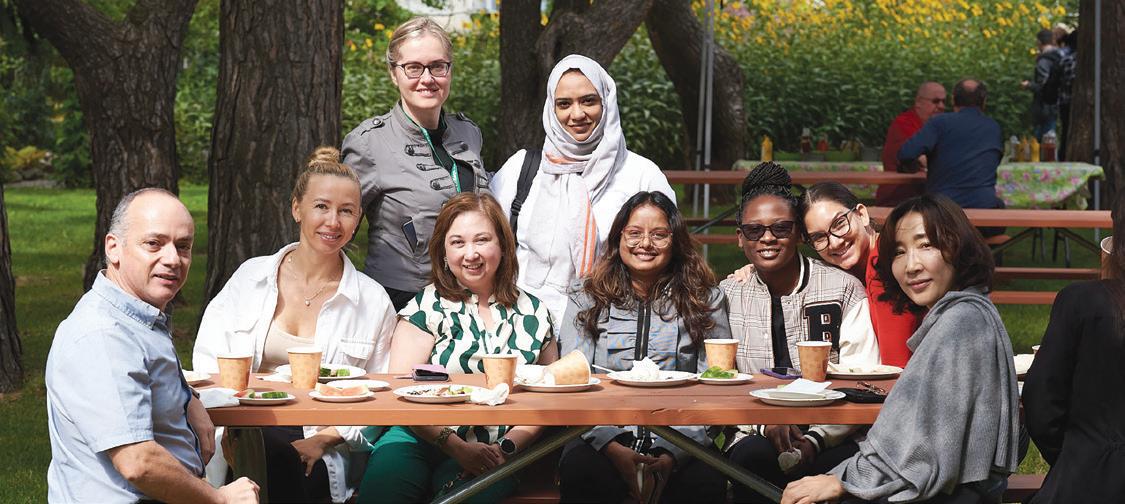
Ketnavi: My experience at CCNM has been truly transformative, but I won’t lie in saying that this isn’t a tough program – it is medical school, after all. I’ve had the opportunity to immerse myself in the study of naturopathic medicine and explore various modalities of healing as well as learn about the biomedical sciences.
The most enjoyable part of being a CCNM student is definitely the sense of community and support that exists within the institution. I’ve had the privilege of being a part of the January cohort which is very small compared in size to September, and this has allowed us to form close bonds. Being part of a tight-knit group provided me with a sense of belonging that makes this demanding program more manageable.
Emily: It’s a satisfying program in the sense that I have been craving this information and never knew where to get it.
It’s also satisfying, and especially coming from an arts background, when I can see the integration. When something clicks, everything you learn makes sense and this is how it connects with all the other things that we’re learning.
I enjoy biomedical sciences and the art and practice of naturopathic medicine. We’re getting all the foundational information and we’re learning how to have critical conversations with patients and I’m thankful that we’re able to have these so early in the experience.
Carissa: It is a challenging program, but that’s something that we signed up for. I think what makes it all worth it is remembering that our efforts result in us being better NDs for our patients in the future.
It feels surreal to be in a tight-knit community. When I first got here, I felt it was almost too good to be true. The students are lovely, and the diversity is so refreshing to see.
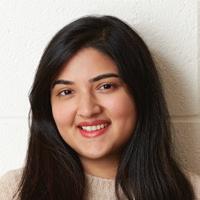
“ The most enjoyable part of being a CCNM student is definitely the sense of community and support that exists within the institution. I’ve had the privilege of being a part of the January cohort which is very small compared in size to September, and this has allowed us to form close bonds. Being part of a tight-knit group provided me with a sense of belonging that makes this demanding program more manageable.”
Ketnavi Ramgoolam Second-year student, CCNM – Toronto Campus
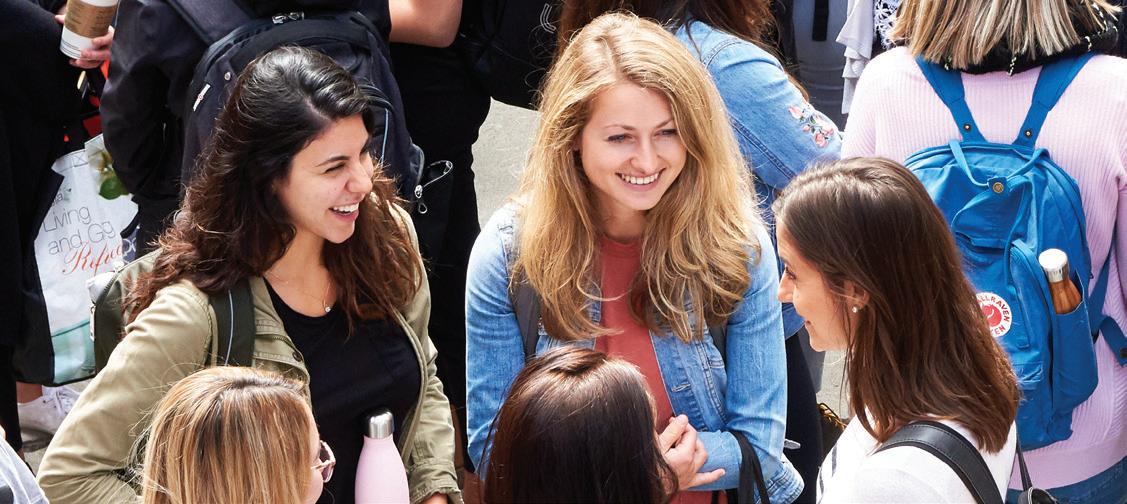
You meet people from all walks of life. And I think it’s great that we’re all coalesced into one place for our individual reasons. So even though the program is a challenge, I’m having a lot of fun. I don’t think I’ve ever been able to say that confidently and without hesitation about any of my educational pursuits in the past.
I really like botanical medicine. I never thought I’d be a big plant nerd, but it turns out I am! Traditional Asian
medicine is another one – part of my heritage is Chinese on my father’s side, so it’s nice to connect with a different part of my culture.
Diego: I heard this on the very first day: this program is like drinking water from a fire hose. And it’s true. There’s a lot of information coming at you constantly and I’ve never been this challenged in my life. But when you welcome it, it’s very exhilarating. It’s exciting to see what you can do
when you show up. And as Carissa said, that is all possible because of this tight-knit community that we have at Boucher. The teachers are heavily invested in you, as well as your peers, so everybody cares about your success.
How is CCNM’s case-based approach different from your undergrad studies?
Jade: The case-based approach is probably my favourite part of the program so far. It’s unique to get a case at the beginning of each week and having each class revolve around that case. What I really love about that is the holistic approach. You see, every week, how the different modalities and aspects of naturopathic medicine (such as biomedical sciences, naturopathic therapeutics, etc.)
intertwine to treat a case and how dynamic and complex every single case is.
So, for example, you get a case on chronic fatigue. In biomedical sciences, we learn about the pathophysiology of what’s occurring in the body, as much as current research shows. Then, in naturopathic therapeutics, we learn what tools exist in each modality to treat that specific
condition. In health psychology, we learn what it’s like to live with chronic fatigue. We’ll read qualitative research on people’s lived experiences and how they can sometimes slip through the cracks of the health-care system.
Then, we get to simulate the case with our classmates and practise how to speak to someone with chronic fatigue. And if you’re the person playing the role, then it gives you an
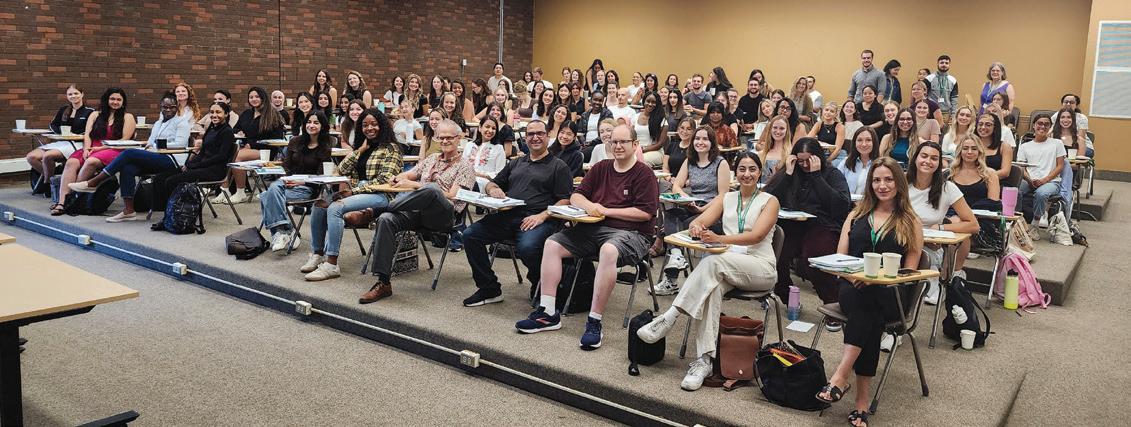
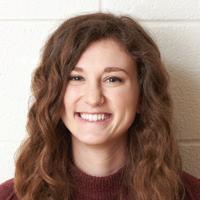
“ I did some science in my undergrad, but I felt the distance between what I was learning and how to apply it in real life. It was interesting and I learned so much, but I think what we’re learning now is tangible, interconnected, and directly applicable to my practice as an ND in four years. So that is exciting to me.”
Emily
Kravet First-year student, CCNM – Toronto Campus
empathetic perspective on how it feels to have this condition. So, it’s an integration of the knowledge, criticalthinking and problem-solving skills, and that real-world perspective from the patient.
Anthony: As Jade said, it’s important for us to practise feeling like a patient with a specific set of symptoms. I know that from my experience – there’s sometimes a disconnect between practitioner and patient in that way, so it’s important to reflect on a patient’s experience and relate to them.
Ketnavi: In my undergrad studies, because I did research, I was familiar with accessing and interpreting peer-reviewed articles with a focus
on theoretical knowledge and understanding concepts. At CCNM, the case-based approach emphasizes the application of knowledge in real-life patient scenarios. So instead of solely learning through lectures or textbooks, CCNM incorporates the use of clinical cases and peer-reviewed articles to enhance learning. These cases provide a context for understanding and applying the principles of naturopathic medicine.
In our patient-centred integrative studies course, we analyze and discuss the details of each case, including the patient’s symptoms, their medical history, and lifestyle factors. I believe that this approach
allows us to develop critical thinking skills and teaches us how to formulate treatment plans based on individual patient needs.
The case-based approach also encourages collaboration and teamwork. We engage in group discussions and problem-solving exercises, working together to analyze the case and develop solid treatment strategies. This collaborative environment fosters a deeper understanding of the complexities of patient care and prepares us for the collaborative nature of health-care practice. I think it also prepares us to become more competent and compassionate NDs.
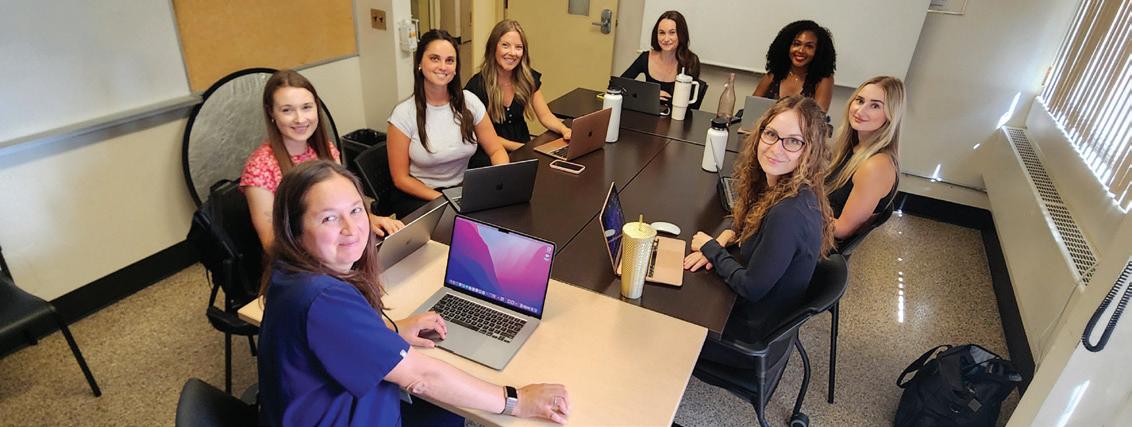
Emily: I did some science in my undergrad, but I felt the distance between what I was learning and how to apply it in real life. It was interesting and I learned so much, but I think what we’re learning now is tangible, interconnected, and directly applicable to my practice as an ND in four years. So that is exciting to me.
I’m also really surprised by how much I’ve grown, both academically and personally, in such a short period. I didn’t realize my brain could retain so much information, but I guess it can! I’m thankful for this environment and its conduciveness to success.
Carissa: With the case-based approach, there is a lot of content and it makes sense when you combine the courses. In biomedical sciences, we have a component called clinical physiology. In that section, maybe we’ll learn a topic about the
gastrointestinal system and you wonder, ‘Why are we talking about the stomach all of a sudden?’ When you get to clinical medicine, which is Diego’s favourite class, the instructor walks you through an abdominal exam. How do you palpate the liver? How do you listen for bowel sounds? And then you understand the method. It’s important to have a big-picture perspective of how the classes spiderweb and connect. The curriculum feels unified and helps cement your learning using a different lens to concentrate on certain topics.
In undergrad, you study a certain subject or a class and hyper-focus on it for a certain period of time. After that, the information goes out the window once you finish that last exam. Here, we continually build on our foundation.
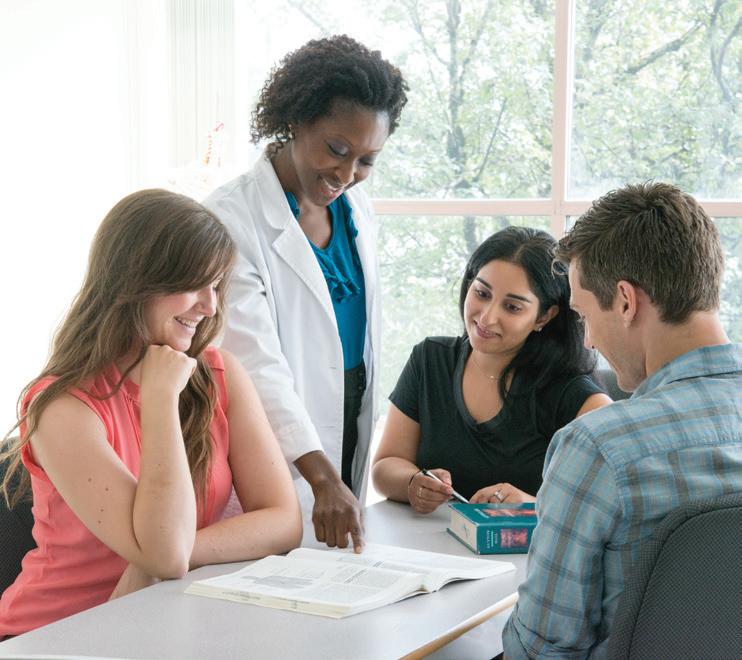
Diego: The congruency of the case-based approach is beautiful. In undergrad, courses are very disjointed. I will never see the mechanisms of a phenol ring anywhere else but in that environment itself. But at CCNM, you learn about the condition, what is happening in the person’s body, and how you can treat it. That’s what I appreciate about the curriculum as opposed to having random classes.
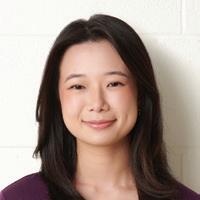
“ It’s important to have a big-picture perspective of how the classes spiderweb and connect. The curriculum feels unified and helps cement your learning using a different lens to concentrate on certain topics. In undergrad, you study a certain subject or a class and hyper-focus on it for a certain period of time. After that, the information goes out the window once you finish that last exam. Here, we continually build on our foundation.”
Sy
Jade: I’m not 100% yet, but what I love about naturopathic medicine is that there is so much you can do with it. One of my passions is environmentalism, and I’m also interested in entrepreneurship. My goal is to interconnect the three: naturopathic medicine, the environment, and entrepreneurship.
Anthony: Patient-wise, I want to work with the chronically ill. Having my own experience being chronically ill has given me a lot of insight and passion into working with these patients, what that entails, and how I could be a good practitioner for them. I’m passionate at providing comfort for people who are otherwise uncomfortable in their current living condition because of their symptoms and illness. Outside of practice, I want to advocate for integrative care and help spark that change within our system.
Ketnavi: I come from an entrepreneurial background, so everybody in my family has their own business. No one is in health care, so I’ll be the first one to own a clinic. But I’ve also always wanted to become a
pharmacist and one day have my own pharmacy. This is something I’m still thinking about, and I’ll decide after I’ve completed studying at CCNM.
Emily: My passion is the education side of it. I was working in marketing, communications, and graphic design and liked what I was doing with students and the AANMC before coming here. I keep finding myself back in these roles where I’m helping to address some of the systemic issues that can be partially resolved with education. One day, I’d like to provide more access to naturopathic medicine education and partnerships with other types of practitioners. We’ve seen that patient outcomes are drastically improved in integrative settings, and that involves education and teaching patients how to take control of their health.
Carissa: Ideally, I’d like to lay down my roots and practise here in B.C. where NDs have the largest scope of practice. As far as other pursuits, I’d like to teach and follow in my dad’s footsteps – he is an educator as well.

Diego: I’m similar to Carissa in that I also think about teaching.
I’m looking forward to the electives in third and fourth year as well – I hope that will give me the chance to find an area of focus. Then I’d like to spend one or two years with a mentor and develop my business and practice skills further.
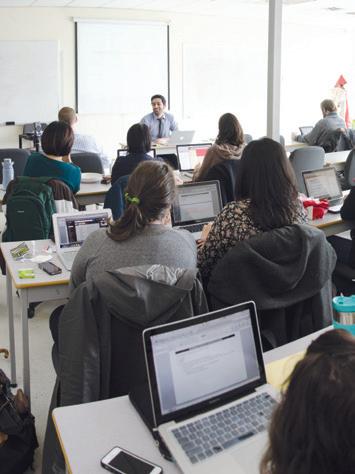
“ I’m looking forward to the electives in third and fourth year as well –I hope that will give me the chance to find an area of focus. Then I’d like to spend one or two years with a mentor and develop my business and practice skills further.”
Diego Souza-Franco Second-year student, CCNM – Boucher Campus
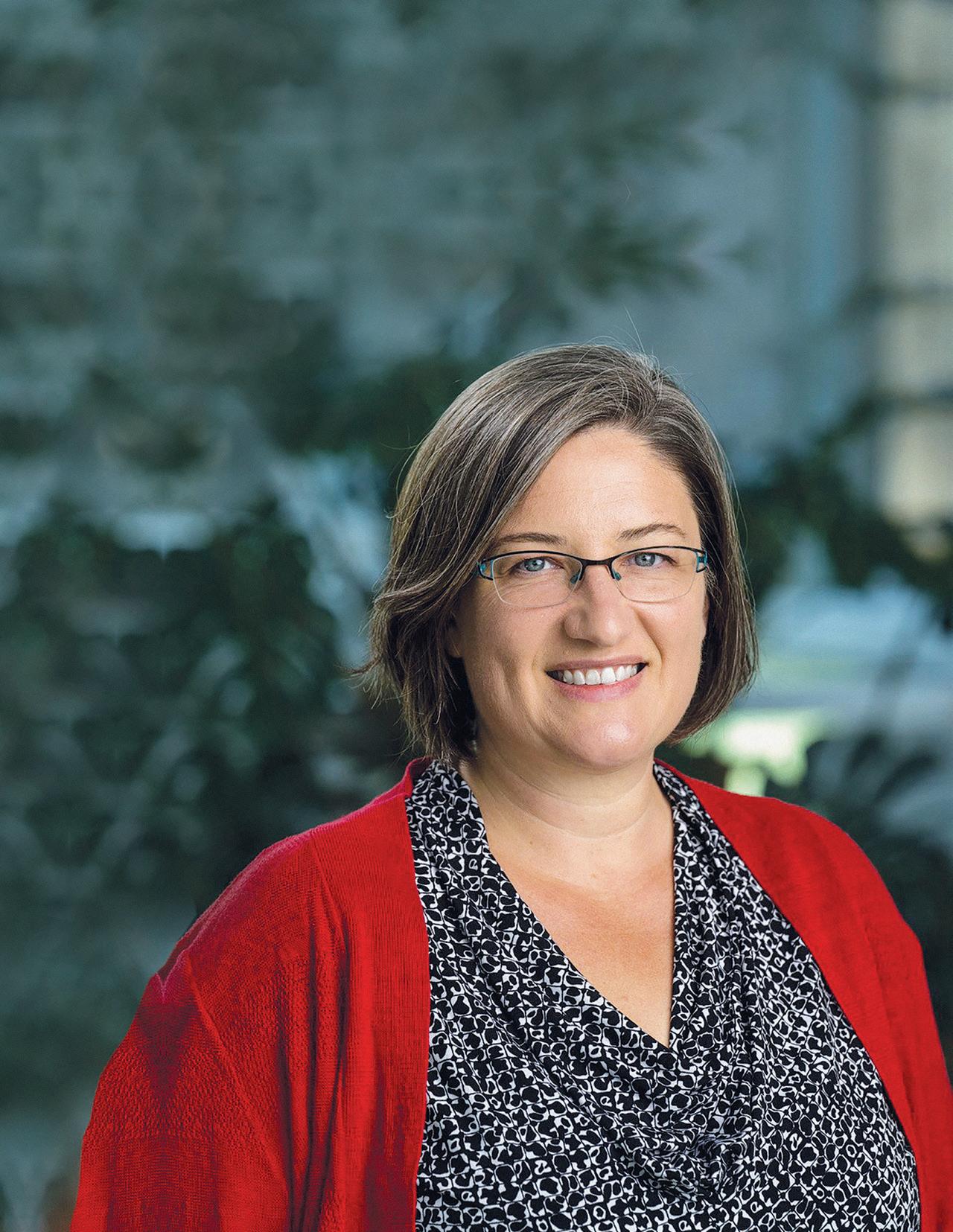
Opportunities for CCNM graduates expand in the university sector.
Naturopathic doctors are increasingly involved in teaching and research positions at Canadian universities, bringing their unique perspectives and experiences to the classroom.
We gather insights from three CCNM graduates, Andrea Gingerich, PhD, Dr. Kim Bretz, ND, and Dr. Monique Aucoin, ND, as they discuss how their academic work promotes future interprofessional collaboration and encourages critical thinking in patient care beyond conventional approaches.
Andrea Gingerich, PhD
(CCNM – Toronto Class of 2002)
Associate professor at the University of Northern British Columbia (UNBC), Division of Medical Sciences
Andrea Gingerich (CCNM – Toronto Class of 2002) is an associate professor at the University of Northern British Columbia (UNBC). In 2006, Gingerich started as a problem-based learning tutor with the Northern Medical Program (NMP), a distributed site of the University of British Columbia’s Medical Doctor Undergraduate Program, and discovered she enjoyed research and teaching. She then completed a master’s degree in medical education and a PhD in health professions education.
As the Case-Based Learning Lead for the NMP, Gingerich trains tutors and facilitates group case work for firstand second-year medical students, highlighting the importance of promoting patient-centred care and fostering diverse student perspectives. Learning to interact with others from different backgrounds is as vital as getting good exam scores. As a tenured faculty member, she leads research on medical education, supervises graduate students, and collaborates on research with colleagues and students.
“ Completing the naturopathic professional program can be a stepping stone to something else you may have not considered. When we graduate, that’s not the end; it may lead to additional training or schooling.”
Andrea Gingerich, PhD (CCNM – Toronto Class of 2002)
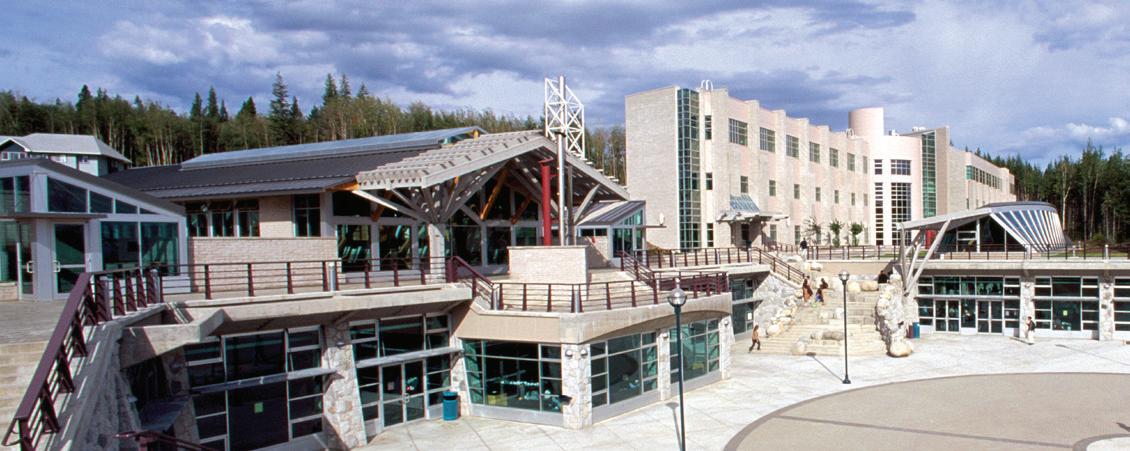
(CCNM – Toronto Class of 2001)
Adjunct faculty member at the Pharmacy School of the University of Waterloo
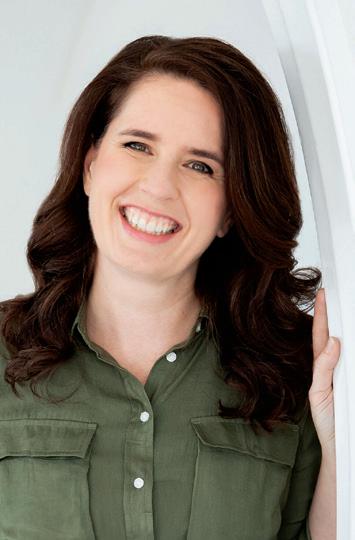
Dr. Kim Bretz, ND (CCNM – Toronto Class of 2001) is an adjunct faculty member at the Pharmacy School of the University of Waterloo. Bretz provides a naturopathic perspective to third-year pharmacy students, emphasizing the significance of interprofessional collaboration, the critical appraisal of research in natural health, and considering options other than pharmaceuticals. Bretz’s career path toward university involvement wasn’t intentional, but evolved after years of guest lecturing on topics about naturopathic medicine and consulting for companies that support the profession.
With a focus on complementary and alternative medicine and how working together across professions can achieve healthier patient outcomes, Bretz highlights the foundation behind interprofessionalism. By helping these university students understand how to incorporate natural medicine options within a conventional medical curriculum, Bretz believes they receive a better-rounded and broader education.
“Promoting our roles as naturopathic doctors is so important. Equally vital is nurturing our professional connections, as building a successful career requires dedicated effort and is challenging to accomplish in isolation. Consistently engaging and participating in your networks can have a meaningful impact.”
Dr. Kim Bretz, ND (CCNM – Toronto Class of 2001)

(CCNM – Toronto Class of 2012)
Adjunct professor at the University of Guelph, Human Health and Nutritional Sciences Department
As a senior research fellow at CCNM and an adjunct professor at the University of Guelph (U of G) Human Health and Nutritional Sciences Department, Dr. Monique Aucoin, ND (CCNM – Toronto Class of 2012) supervises fourth-year U of G students in experiential learning courses where students participate in the conduct of research.
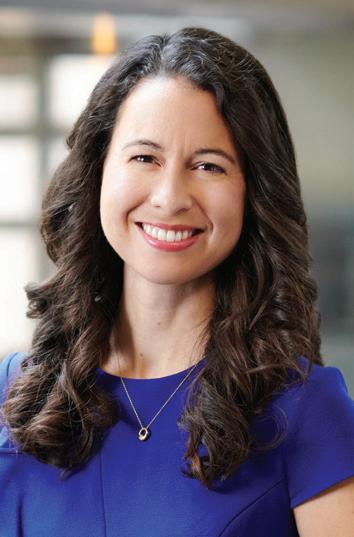
Aucoin is currently leading a clinical trial exploring the effects of dietary counselling and omega-3 supplementation in treating Generalized Anxiety Disorder (GAD). This research project, the first in the world, has provided opportunities for CCNM and U of G students to experience and contribute to designing, conducting, and communicating the findings of a clinical trial.
“ Although the involvement of NDs at other universities and colleges in Canada is still somewhat rare, it’s an exciting opportunity for collaboration with researchers beyond the naturopathic profession and exposing students to naturopathic medicine as a potential career path.”
Dr. Monique Aucoin, ND (CCNM – Toronto Class of 2012)
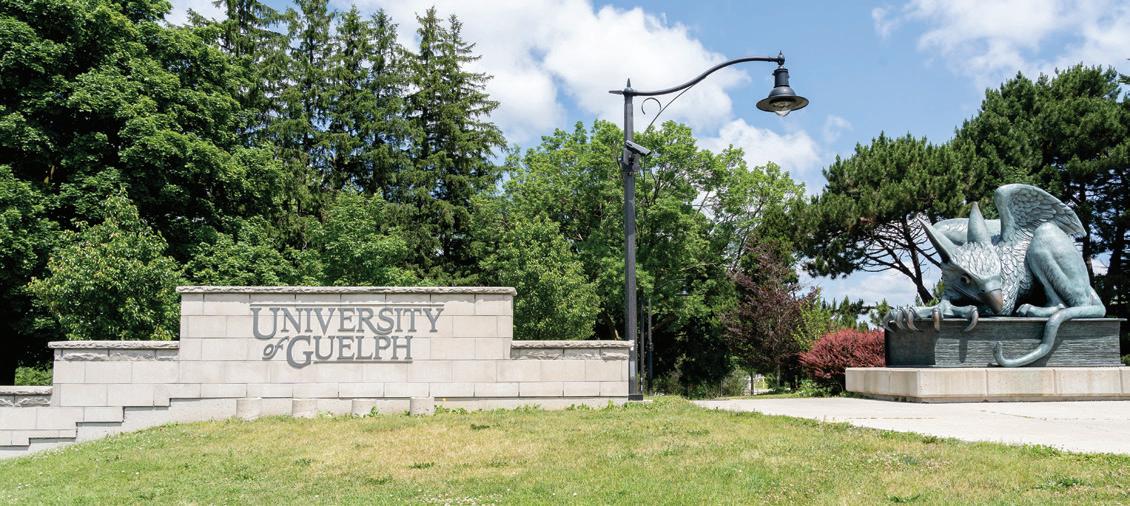
The Canadian College of Naturopathic Medicine (CCNM) is fortunate to benefit from a long list of friends and supporters. The following individuals and organizations help CCNM achieve its mission to educate, develop and train naturopathic doctors through excellence in health education, clinical services, and research that integrate mind, body, and spirit.
By investing in research, scholarship, teaching clinics and other areas at the College, our supporters help CCNM lead the development of primary health care through education in naturopathic medicine and foster positive change in our health, our environment and our health-care system.
CCNM is a charitable education institution, and receives no direct financial support from federal or provincial governments.
Our financial health depends on the generosity and commitment of our supporters, who believe in the work we do and support naturopathic education and research. On behalf of our students, alumni, faculty, staff, and clinic patients, we thank you.

Your support helps CCNM make a difference in advancing health care. Direct your gift to:
• Clinical services
• Student scholarships and bursaries
• Lecture series
• CCNM Integrative Cancer Clinic
• Patterson Institute for Integrative Oncology Research
• Research in naturopathic medicine ccnm.edu/donate
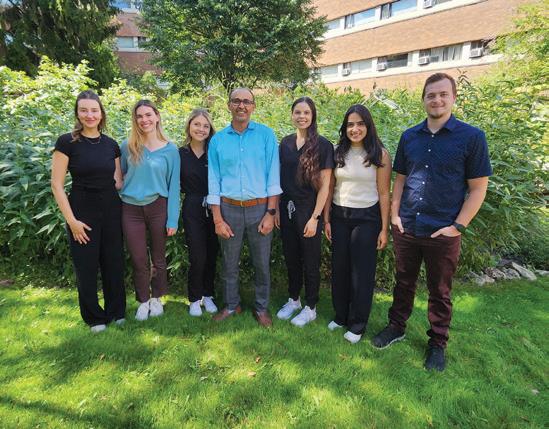
The following list recognizes cumulative giving from active supporters who contributed $50 or more between September 1, 2022 and August 31, 2023.
$2 Million Plus
Lotte and John Hecht
Memorial Foundation
The Schad Foundation
$500,000 Plus
Atrium Professional Brands
Estate of Christine Elizabeth Ward
York Downs Chemists
$250,000 Plus
AOR
CanPrev Premium Natural Health Products
$100,000 Plus
Anonymous
Bioclinic Naturals
Boiron Canada
Cyto-Matrix Inc.
Estate of Yvonne Sinnott
Healthy Planet
Karen van Dongen Foundation
McConnell Foundation
Nutritional Fundamentals For Health (NFH)
Opis Supplies (ETD)
Rocky Mountain Analytical
St. Francis Herb Farm Inc.
$50,000 Plus
Alpha Science Laboratories
Bob Bernhardt
Fortinos
Fullscript
Mississaugas of Scugog Island First Nation
Pascoe Canada
$25,000 Plus
AlgaeCal Inc.
AquaOmega Canada
Designs for Health Inc.
Dr. Dugald Seely, ND
Eastern Currents Ltd.
Greeniche Natural Health Inc.
Helixor Canada Inc.
Kim & Irene Piller
NaturPharm Inc.
ProMedics Nutraceutical Ltd.
Pure Integrative Pharmacy
Vitazan Professional
$10,000 Plus
Barbara Young
Keith Pownall
Dr. Kieran Cooley, ND (non-clinical)
Dr. Leslie Solomonian, ND
Dr. Nick De Groot, ND (non-clinical)
Dr. Verna Hunt, ND
Vita Aid
$5,000 Plus
Donna Sharp
Dr. Jasmine Carino, ND (non-clinical)
Lisa Singh
Ljubisa Terzic
Ottawa Community Foundation
Peaches and Green
Plant a Seed & See What Grows Foundation
Dr. Rahima Hirji, ND
William Van Iterson
Dr. Zeynep Uraz, ND
$2,500 Plus
Dr. Colleen McQuarrie, ND / Ottawa Integrative Health Centre
Fatima Damji
Ferlow Botanicals
Frances Makdessian
Gail Spring
Dr. Hal Huff, ND
James Davidson
Janet Miller Mackay
Dr. Joanna L. Sparrow, ND
Judy Young
Lela Zych
Dr. Noya Madadi-Kahkesh, ND
Rosario C. Barter
Shiraz and Nurjehan Bharmal
$1,000 Plus
Centre for Health Innovation
Cynthia Harding
ITL Health
Dr. Jonathan E. Prousky, ND
Judith Pettersen
Karen A. Claney
Laura Da Re
Linda and Mac Sparrow
Dr. Rachel F. Stewart, ND
Dr. Rahim Karim
Dr. Sejal Parikh-Shah, ND
United Way Eastern Ontario
Zahir Bhanji
$500 Plus
Dr. Alyson Munkley, ND
Foot by Foot Inc
Dr. Glenys I. Brydges, ND
Healthy Web – Fullscript
Dr. Kate E. Rhéaume, ND
$250 Plus
Brian Kalish
Darlene Eng
Eli Amey
Genevieve Brown
Heidi Vincent
John & Janet Murphy
Leila Rafi
Margarita Catindig
Sharon Boatswain
$100 Plus
Ekua Kariuki
Elizabeth Dobis
Elsa Silva
Family Higgins
Farah Jaffer
Farzana Khimji
Janet Brown
Dr. Laura Belus, ND
Laurie Hislop
Linda Dadswell
Lorna Kingsland
Maria Moreno
Mary Konyah
Megan Morgan
Monika Goyal
Mourad Sadji
Dr. Priya Duggal, ND
Prostate Cancer Support
Toronto
Dr. Rachel CorradettiSargeant, ND
Rakesh Jain
Ray Lawrence
Romana Rice
$50 Plus
Alisia Sabatini
Anila Radovicka
Caroline Benyes
Dr. Laura Hoffmann, ND
Florence Adebayo
Giselle Melillo
Harry Ananth
Insight Naturopathic Clinic
Jayne Bell
Jeswyn Devas
Joanne Belgrave
Linda Percy
Yvonne Meade
We thank the following for their generous historical contributions to CCNM. Although they are not current donors, we appreciate their support over the years.
$1 Million Plus
Husky Injection Molding Systems Ltd.
$750,000 Plus
John & Thea Patterson
$250,000 Plus
David Klausner
Essiac Canada International
Metagenics
Valeant Canada Consumer Products
$100,000 Plus
Body Mind Science Resources Ltd.
Dr. Michael A. Prytula, ND
Jane M. Wilson
$50,000 Plus
Biomed International Products Corporation
Natural Factors Nutritional Products Ltd.
Restorative Formulations
SISU Inc.
$25,000 Plus
Gwen Lee
Paul Battistuzzi
$10,000 Plus
Ernst & Young
Land Art Inc.
We are grateful for the gifts made in honour/memory of the following:
In Honour of:
Dr. Ajay Lad, ND
CCNM students of RSNC
Dr. Dan Lander, ND
Dr. Eric Marsden, ND
Dr. Paul Davis, ND
In Memory of:
Alex Lajos
James W. Spring
Joanne Bozikis
Joseph Dobis
Kimberly V. Goodwin
Mariette DeFaria
Mubina Jiwa
Nicole Robinson
Nina Sgro
Ronald A. Ingard
Selly and Y. Benyes
We thank the following donors who have made gifts of a lifetime through bequests or life insurance:
Estate of Christine
Elizabeth Ward
Estate of Frances Eastman
Estate of Gordon Wilinski
Estate of Ina Meares
Estate of Joyce Isabella Vanderburgh
Estate of Kenneth Luby
Estate of Linda Ganly
Estate of Lucy Hopkins
Estate of Marilyn A. Scheifele
Estate of Patricia Thorsley
Estate of Roger & Mary McCrorie
Estate of William McQueen
Estate of Yvonne Sinnott
Heinz Vollenweider
Karen van Dongen Foundation
The following companies have generously donated gifts-in-kind in the past year:
AquaOmega Canada
Atrium Professional Brands
Boiron Canada
CanPrev Premium Natural Health Products
Cyto-Matrix Inc.
Eastern Currents
Ferlow Botanicals
Helixor Canada Inc.
ITL Health
NaturPharm Inc.
Nutritional Fundamentals For Health Inc.
Opis Supplies (ETD)
Pascoe Canada
Peaches and Green
Pure Integrative Pharmacy
St. Francis Herb Farm
York Downs Chemists
The following research partners and supporters have engaged in projects with the Canadian College of Naturopathic Medicine, the Ottawa Integrative Cancer Centre and the Patterson Institute for Integrative Oncology Research.
Abbey Retreat Centre
Academic Collaborative for Integrative Health (ACIH)
Academy of Integrative Health and Medicine (AIHM)
Advanced Orthomolecular Research Inc. (AOR)
AquaOmega
Atlas Institute for Veterans and Families
Assured Natural Distribution Inc. (Bioclinic Naturals)
Australian Research Centre in Complementary Medicine (ARCCIM), University of Technology Sydney
Bastyr University
Babol University of Medical Science
Biotics Research Inc.
Canadian Association of Thoracic Surgeons
Canadian Interdisciplinary Network for Complementary and Alternative Medical Research (INCAM)
Canadian Memorial Chiropractic College (CMCC)
CanAlt Laboratories
Cancer Choices
Canopy Health Innovations
CanPrev Premium Natural Health Products
Central Council for Research in Yoga and Naturopathy, Ministry of Ayush, Govt of India
Centre for Health Innovation (CHI)
Centre de recherche du Centre hospitalier de l’Université de Montréal
CHEO Foundation Children’s Hospital of Eastern Ontario
Chronic Pain Center of Excellence for Canadian Veterans
Cyto-Matrix Inc.
Ekhagastiftelsen
Endeavour College of Natural Medicine
Fullscript
Gateway for Cancer Research
Harvard University
Health Source Integrative Medical Centre
Integrated Health Clinic Cancer Care Centre
John and Thea Patterson and family
Knowledge in Naturopathic Oncology Website (KNOW)
Leslie Dan School of Pharmacy, University of Toronto
Lipid Analytical Laboratories
Marsden Centre for Excellence in Integrative Medicine
McGill University
Mitacs
National University of Natural Medicine (NUNM)
Natural Health Products Research Society (NHPRS)
Nutritional Fundamentals for Health (NFH)
Oncology Association of Naturopathic Physicians (OncANP)
Open University of the Netherlands
Ottawa Hospital Research Institute
Pediatric Association of Naturopathic Physicians (PedANP)
RAND Centre for Collaborative Research in Complementary and Integrative Health
Royal Victoria Hospital Research Institute
Seroyal
Shogun Maitake
Sobeys, Inc.
Society for Integrative Oncology (SIO)
Southern Cross University, National Center for Naturopathic Medicine
Sunnybrook Research Institute
The Canadian CAM Research Fund
The Lotte and John Hecht Memorial Foundation
The Naturopathic Medical Students Association
The University of Toronto
The World Naturopathic Federation (WNF)
University of Guelph Vitazan Professionals
William Osler Health System & Brampton Civic Hospital
York Downs Chemists
CCNM executives strategize essential day-to-day business operations, lead core initiatives, and establish organization-wide policies and procedures.
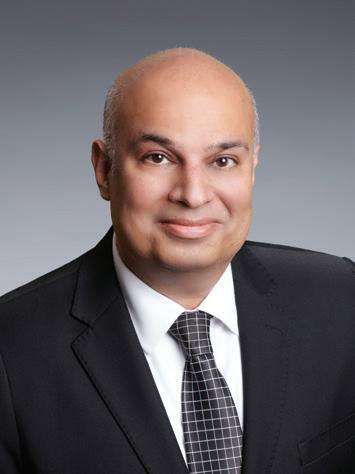
Dr. Rahim Karim, B.Sc., DC, MBA, CHE, ICD.D President & CEO
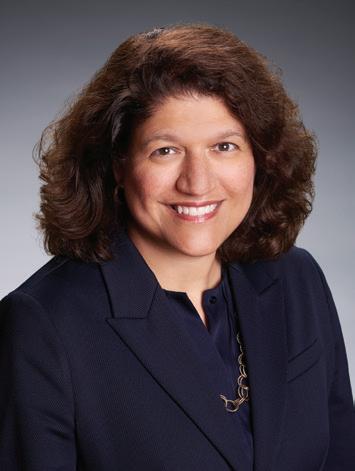
Simone Philogène, MA
Chief Enrolment, Marketing and Communications Officer President, CCNM Press
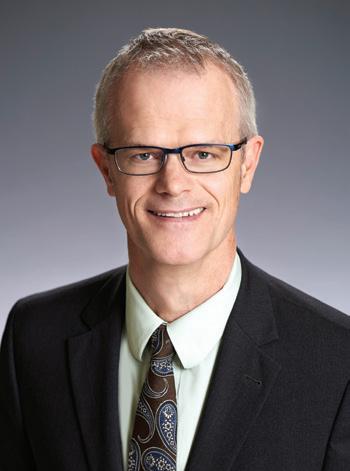
Dr. Nick De Groot, ND (non-clinical), M.Ed. Dean
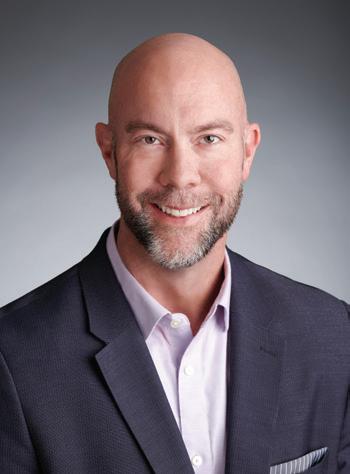
Reid Wildeman, M.Ed.
Director, Campus Operations and Academic Affairs, CCNM – Boucher Campus
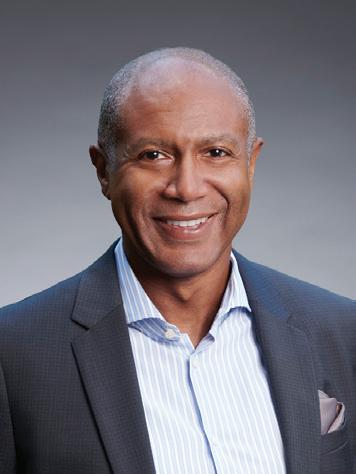
Trevor Ellis, MBA, CPA Chief Financial Officer
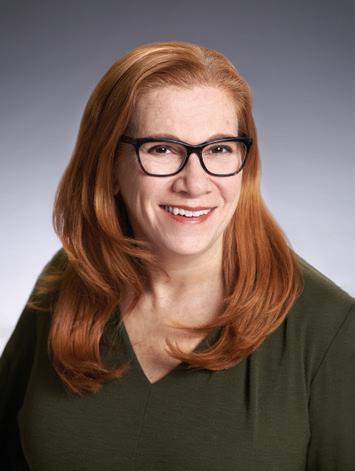
Barbara Young, BA Executive
Director, Human Resources
Our administrative team brings together leading researchers, clinicians, and teachers in naturopathic medicine to help students prepare for successful careers as NDs.
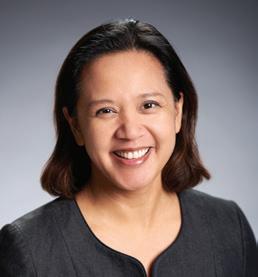
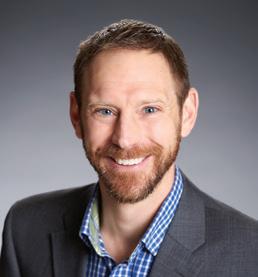
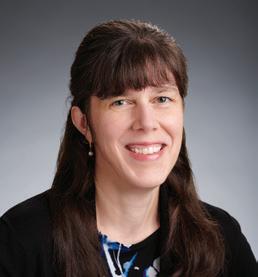
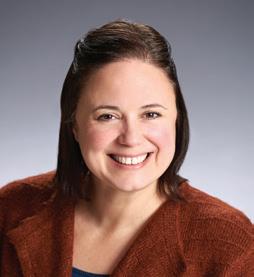
Associate Dean of Curriculum and Residency,
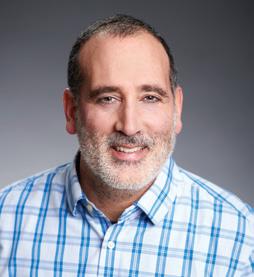
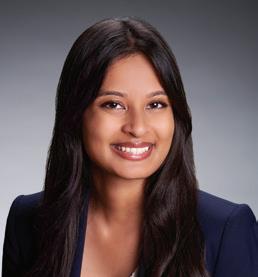
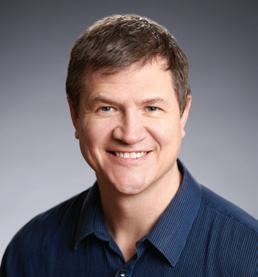
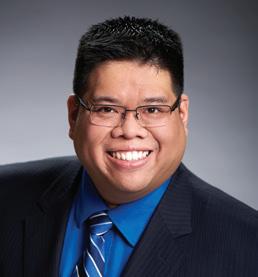
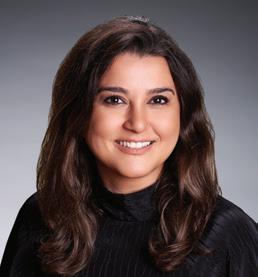
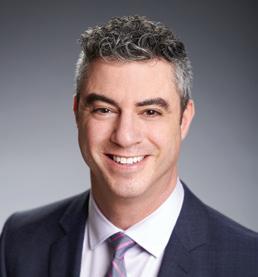
The Canadian College of Naturopathic Medicine (CCNM) is a federally registered charitable organization which operates campuses in Ontario and British Columbia.
CCNM receives no direct government funding, and is dependent on student tuition, clinical and residence fees, and donations for its operations.
CCNM’s Board of Governors consists of naturopathic doctors and laypersons from a variety of disciplines. The Board’s mandate is to govern the
organization through effective policy oversight and by ensuring executive performance achieves the vision and goals of the organization.
*as at August 31, 2023
BOARD OF GOVERNORS
Dr. David Duizer, ND (Chair) Co-Owner, Noble Naturopathic Vancouver, British Columbia
Gannady Raskin (Vice-Chair) Executive Director, Medical Education Readiness Program Miami, Florida
Angela Hildyard, PhD (Vice-Chair) Special Advisor to the President and the Provost, Professor of Higher Education, University of Toronto Toronto, Ontario
Dan Abrahams, LLB VP, Policy & Governance & Chief Legal Officer, Professional Engineers Ontario Toronto, Ontario
Dr. Carol Morley, ND Owner, Zawada Health Mississauga, Ontario
Dr. Orest Szczurko, M.Sc., ND Owner, Noumena Health Mississauga, Ontario
Dr. Katherine Anderson, ND Enterprise Director, Virtual Health Operations, Cancer Treatment Centers of America Tulsa, Oklahoma
Dr. Rahima Hirji, ND Owner, Sage Naturopathic Clinic Kitchener, Ontario
Dr. John Cosgrove, ND, M.Sc. President, NaturPharm Barrie, Ontario
Dr. Heidi Standeven, ND Owner, Foundations Naturopathic Health New Westminster, British Columbia
Laura Da Re, CPA, CA VP Finance, Numeris Toronto, Ontario
Meagan McLaren, BHSc., M.Sc. Student Governor
Carlee Kamar, B.Sc. Kin. Student Governor
Ron Noble, MBA President and CEO, Catholic Health Association of Ontario Toronto, Ontario
Dr. Elaine Lewis, ND Owner, One Elephant Integrative Health Team Oakville, Ontario
Gordon Piercey, CPA, CA, MFAc, ICD.D President, GWP Advisory Inc. Mississauga, Ontario
NON-VOTING REPRESENTATIVES
Dr. Rahim Karim, B.Sc., DC, MBA, CHE, ICD.D President & CEO
Jason Gemmill (Secretary) Executive Assistant, President’s Office
Dr. Lauren Bennett, ND (Toronto Campus Staff Representative) Director, Clinical Services
Desil Manapat, BA, MA (Boucher Campus Staff Representative) Manager, Student Life
Dr. Jessica Hobson, ND, B.Sc. (Boucher Campus Faculty Representative) Core Academic Faculty
Dr. Chris Pickrell, ND (Toronto Campus Faculty Representative) Clinic Faculty
CCNM is Canada’s leading naturopathic medicine education provider and has been educating naturopathic doctors for over 45 years.
The Canadian College of Naturopathic Medicine is committed to reflect the following values in its deliberations and actions:
• Integrity
• Collaboration
• Innovation and adaptability
• Respect for equity, diversity, inclusion
OUR VISION
CCNM will make naturopathic medicine an integral part of health care through pre-eminent education, research and clinical services.
The Canadian College of Naturopathic Medicine will:
• Demonstrate excellence in education to our students, supporting them throughout their careers;
• Provide a working environment that allows our faculty and staff to excel;
• Expand our knowledge of naturopathic medicine through high quality research;
• Excel in delivering naturopathic medicine to our patients;
• Forge a strong relationship between allopathic and naturopathic medicine with a focus on affordable, accessible and effective health care;
…and so, make the practice of naturopathic medicine widely acknowledged as key to maintaining patient health.
FIVE ENDS
To drive CCNM in its pursuit of excellence in naturopathic medicine, CCNM’s Board of Governors has developed five “Ends” or goals:
Excellence in Education
Educate naturopathic doctors on the basis of clear and focused curriculum, delivered by the most competent faculty, and graduate high-quality naturopathic doctors.
High-Quality Clinical Services
Provide high-quality naturopathic care in a clinical setting, resulting in positive educational experiences for students and positive outcomes for patients and clients.
Excellence in Research
Conduct and disseminate research relevant to naturopathic medicine and help develop skills among faculty, students, and graduates that foster research activity and a culture of evidence-informed clinical practice.
Leading Voice
Increase the awareness and trust of CCNM as a leading voice for naturopathic medicine.
Change Agent
Be a leader and advocate of naturopathic medicine as positive change to our health, our environment and our health-care system.
At the heart of CCNM, from its inception in 1978 , is a spirit of partnership, innovation, and commitment that extends Canada-wide.
One Institution. Two Campuses. One Team.

Educating naturopathic doctors in North America for over 45 years